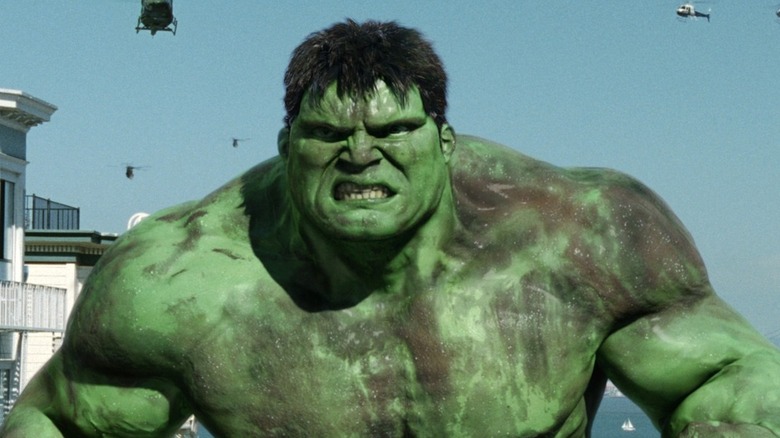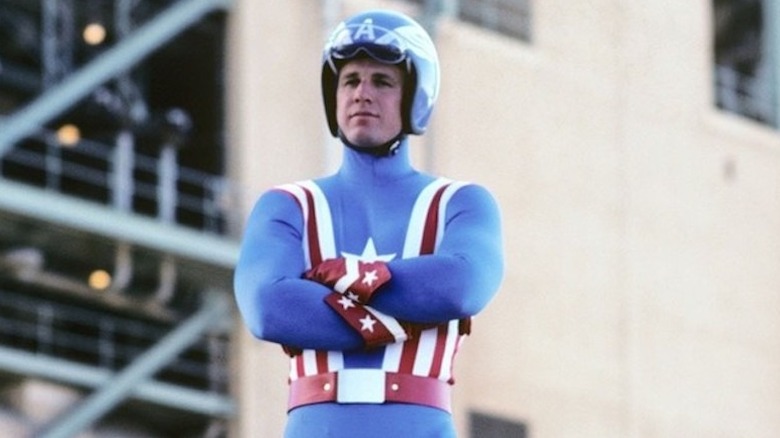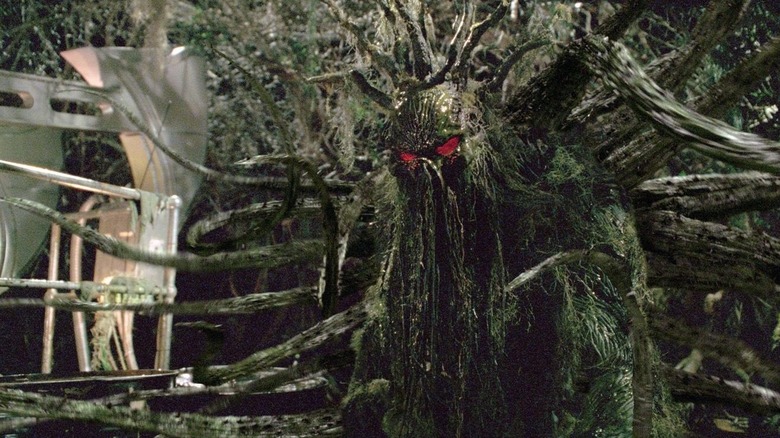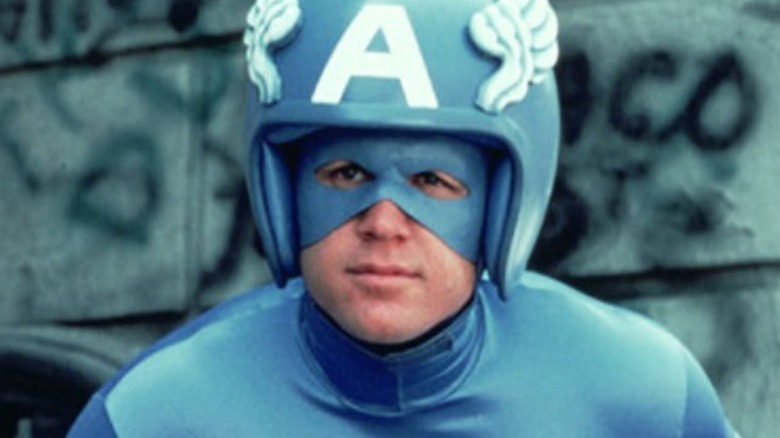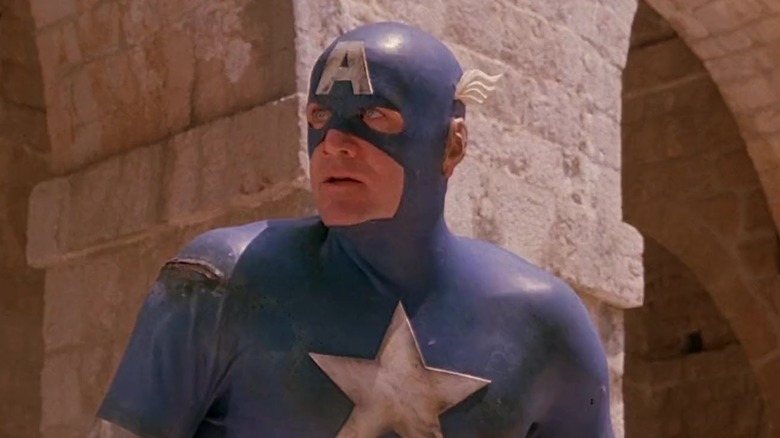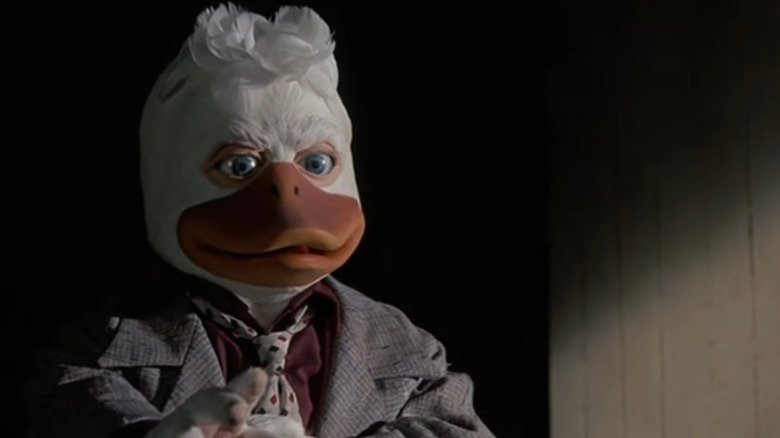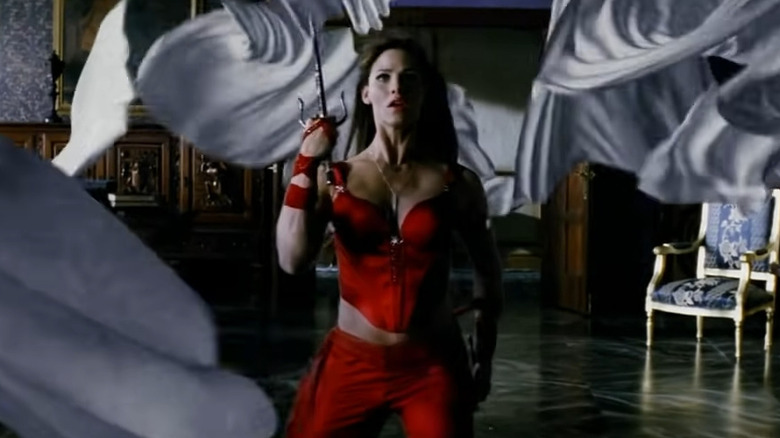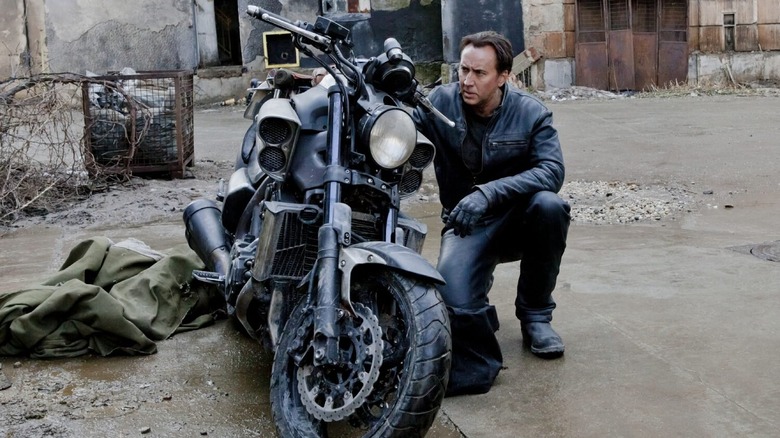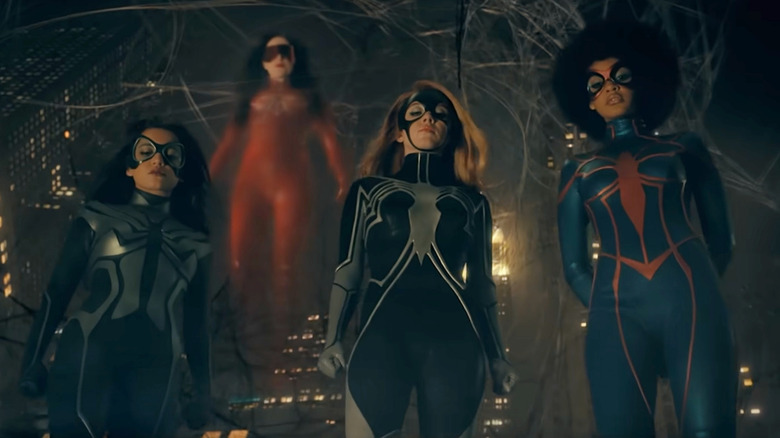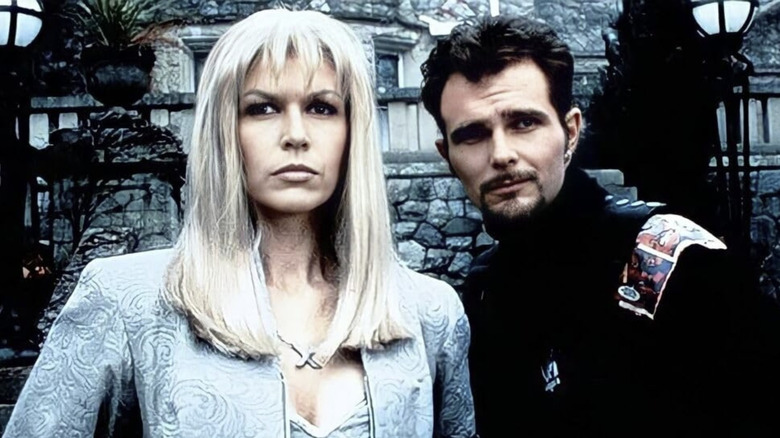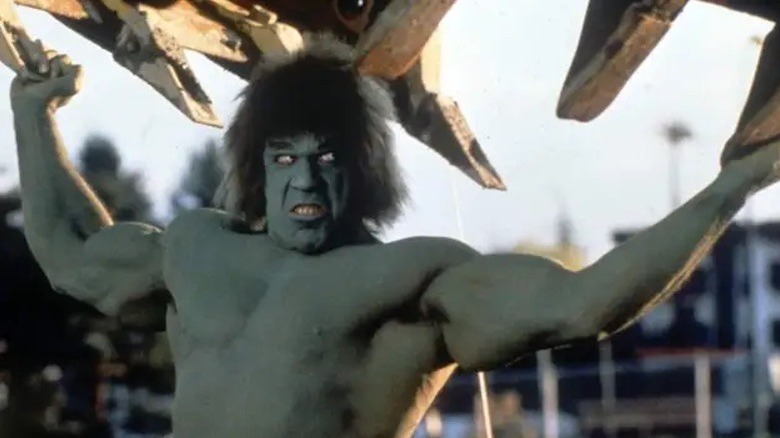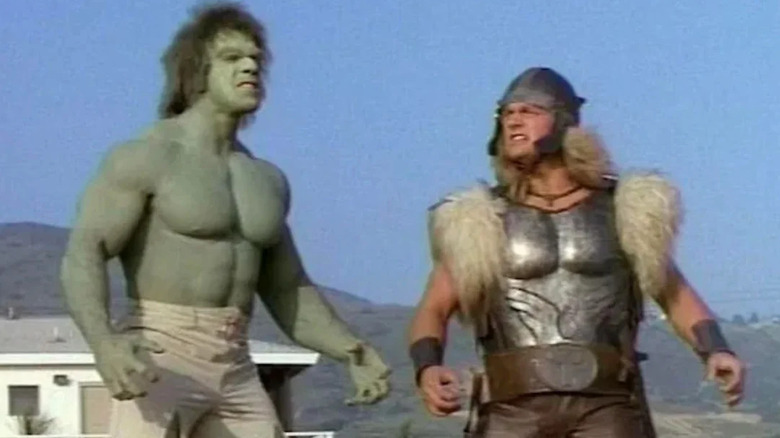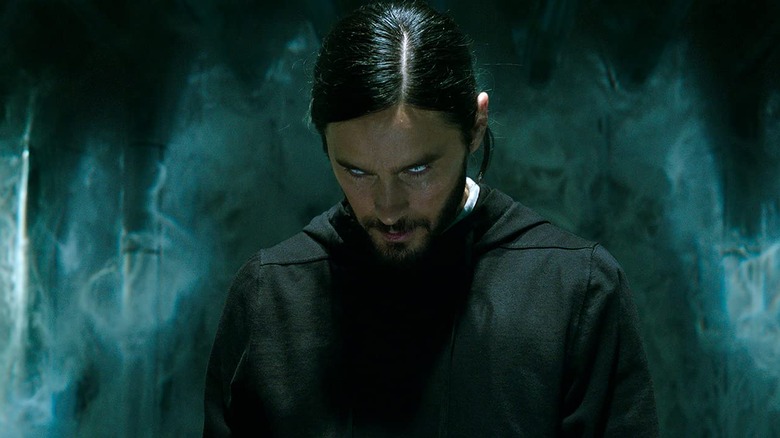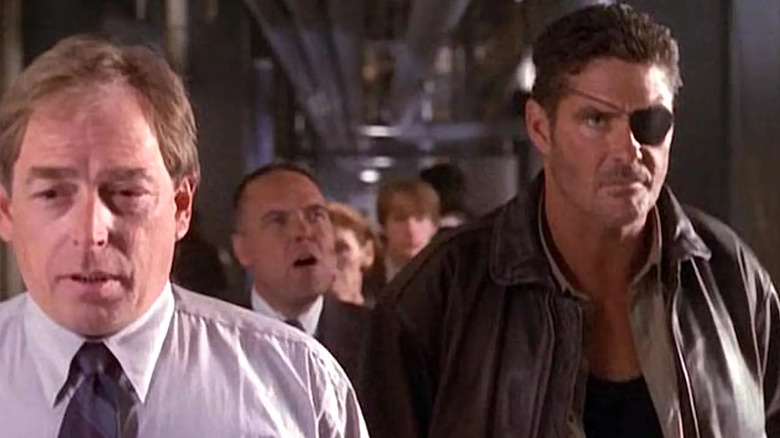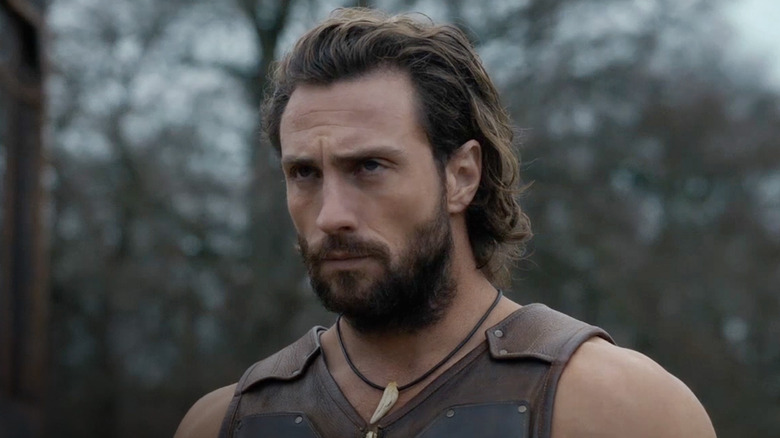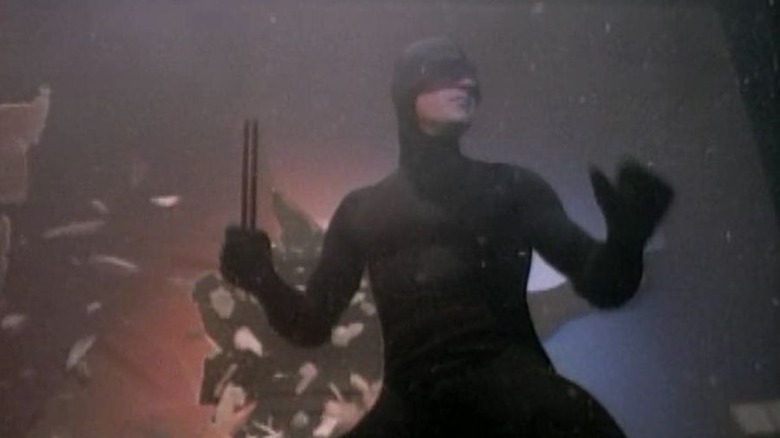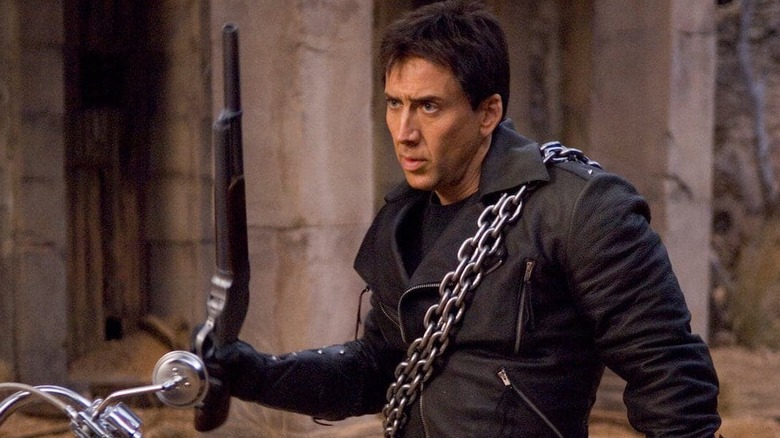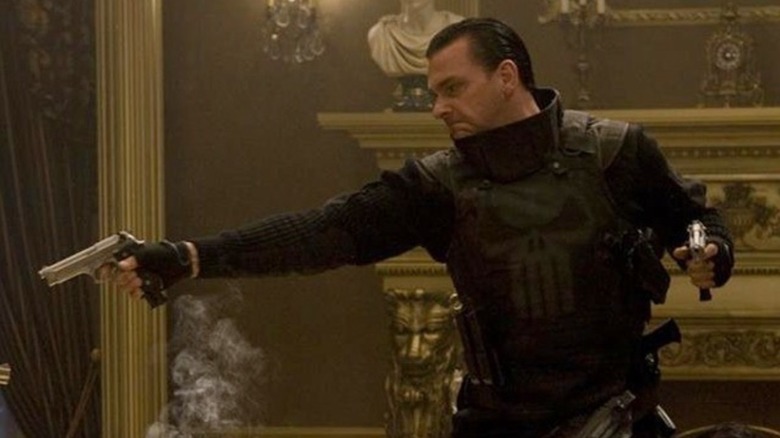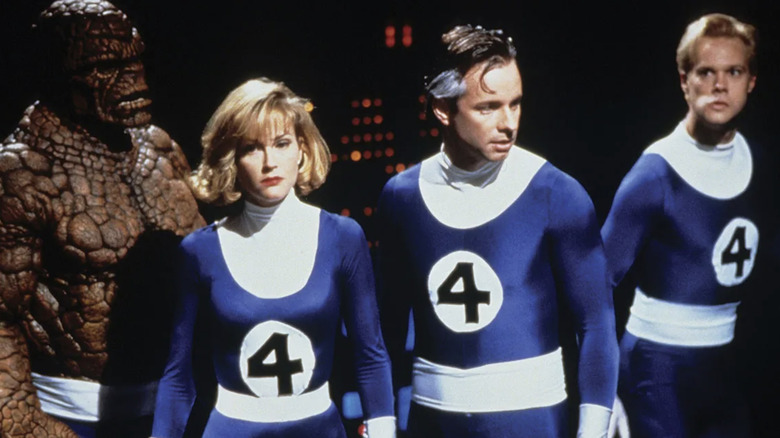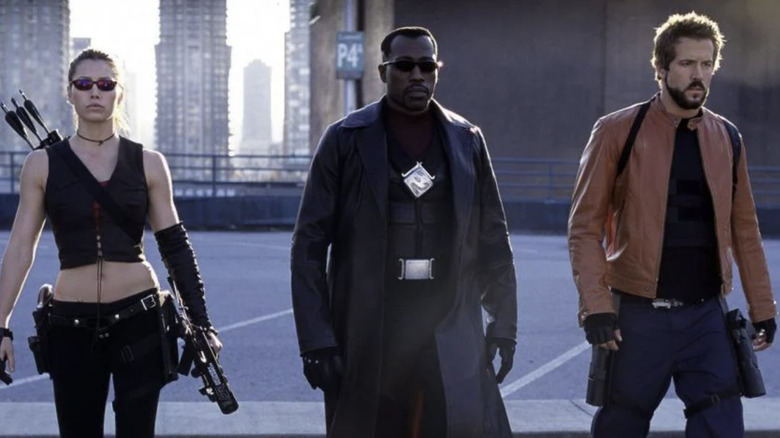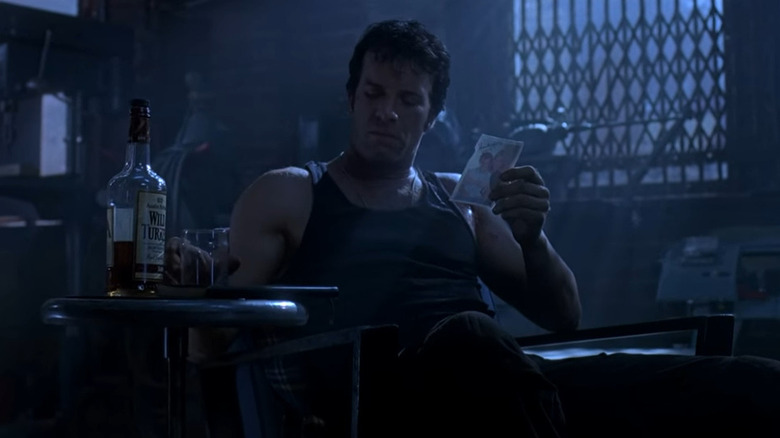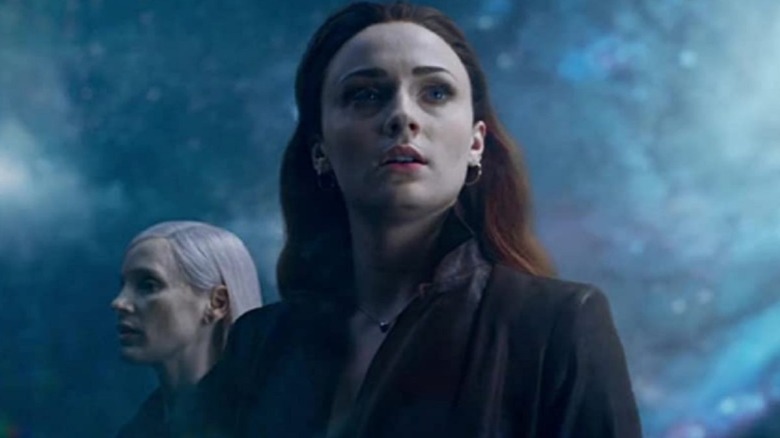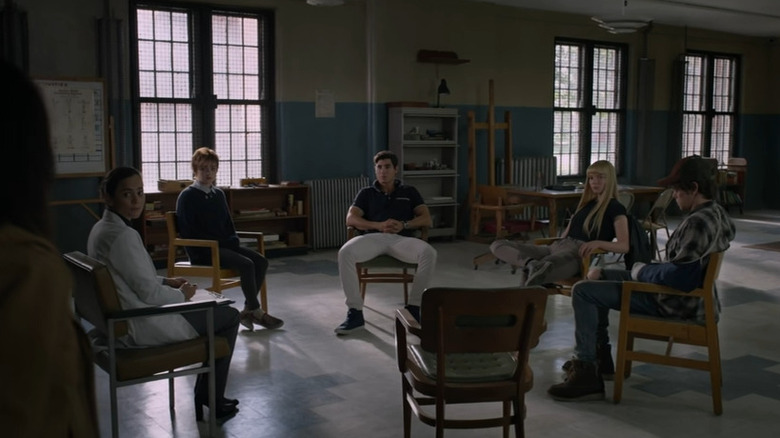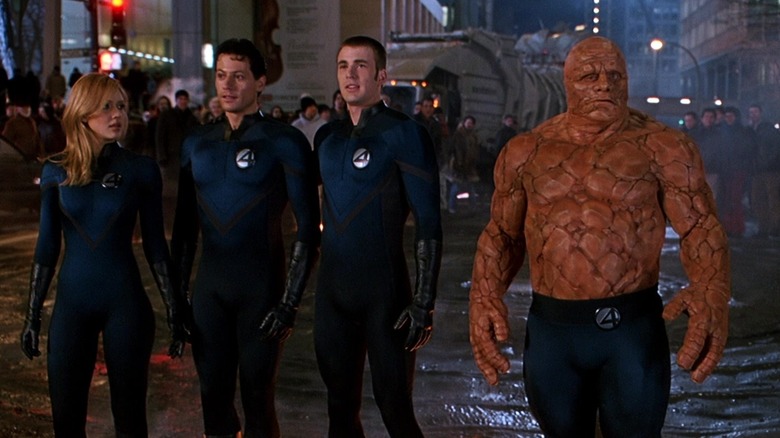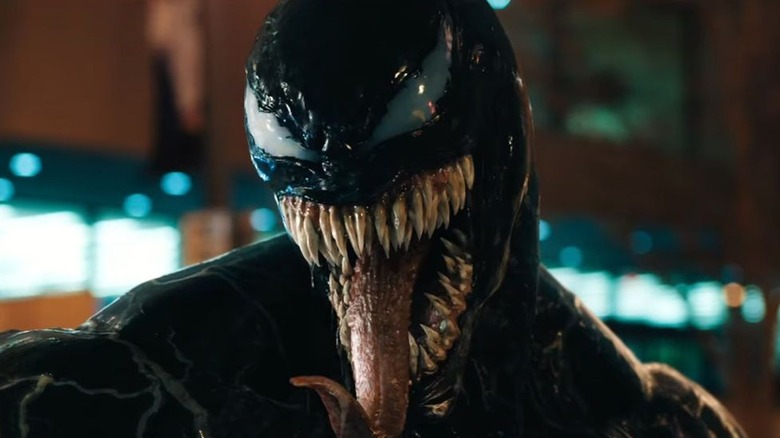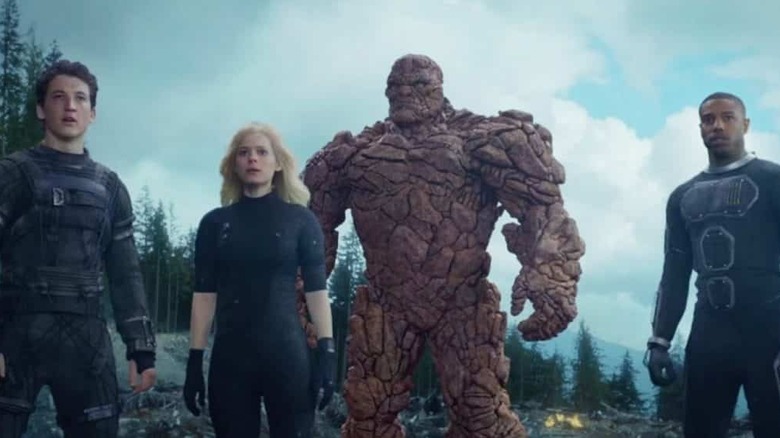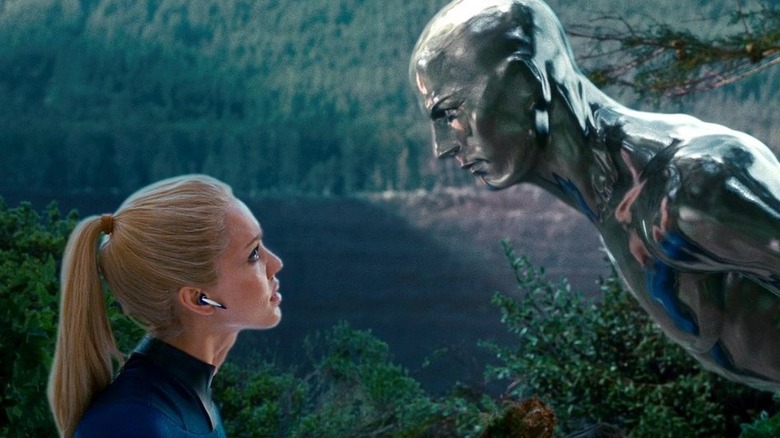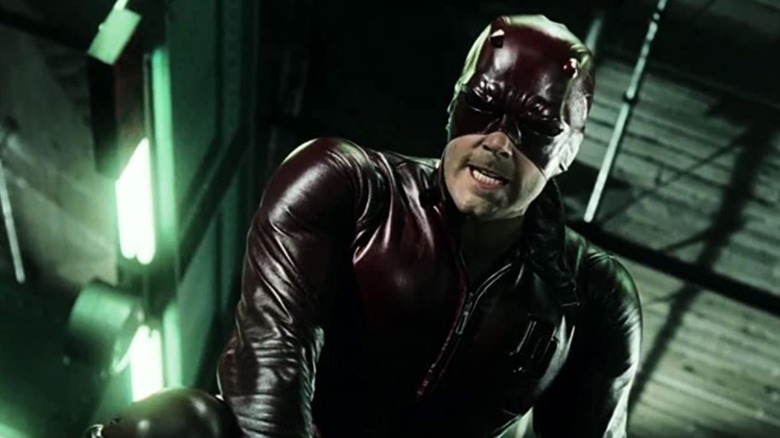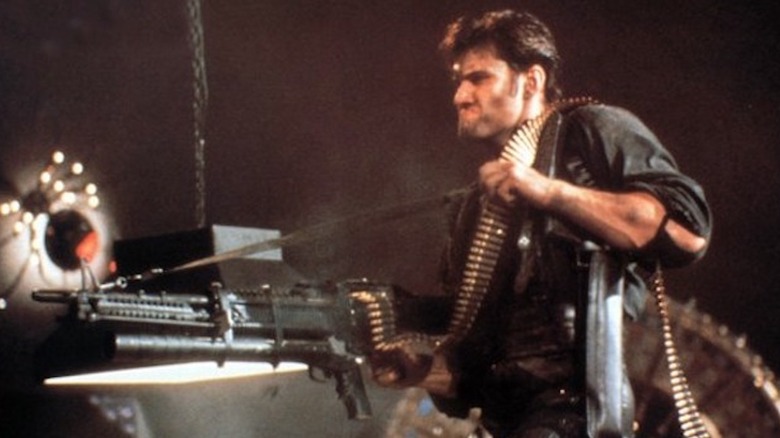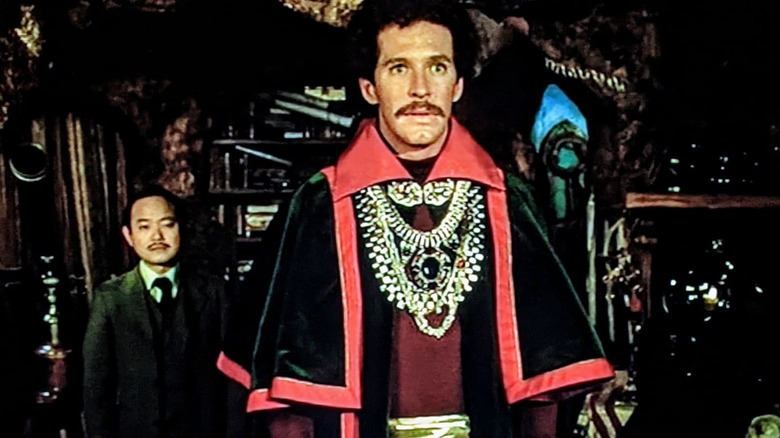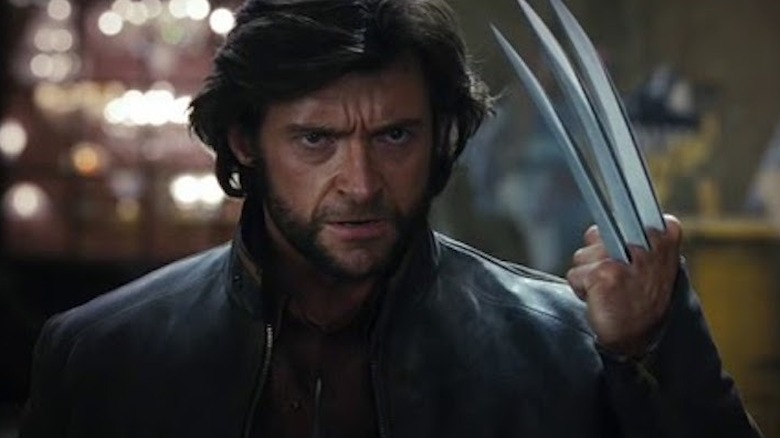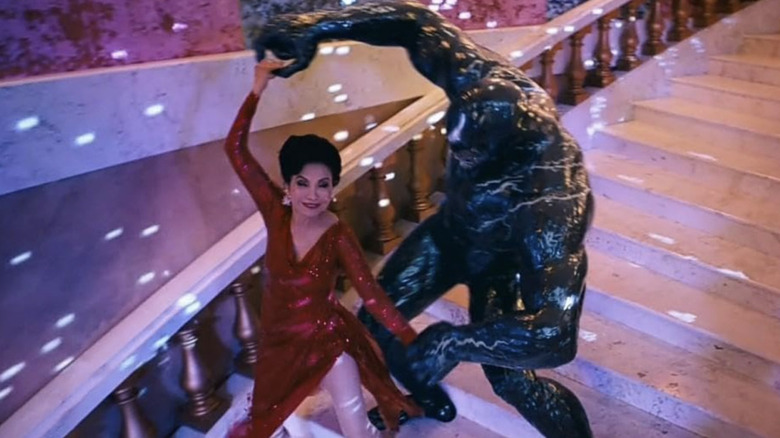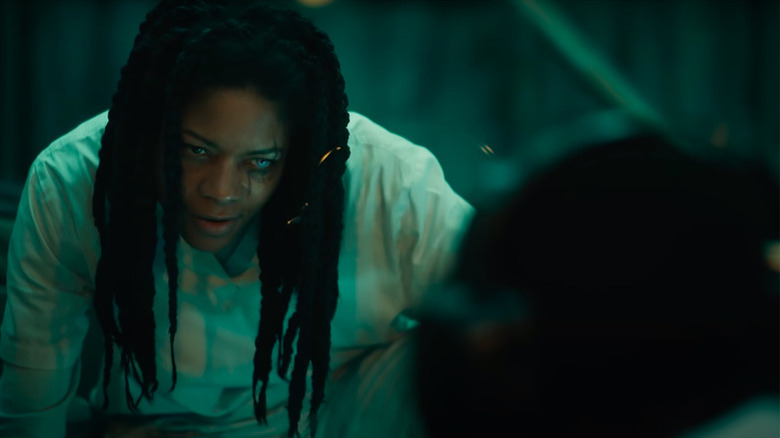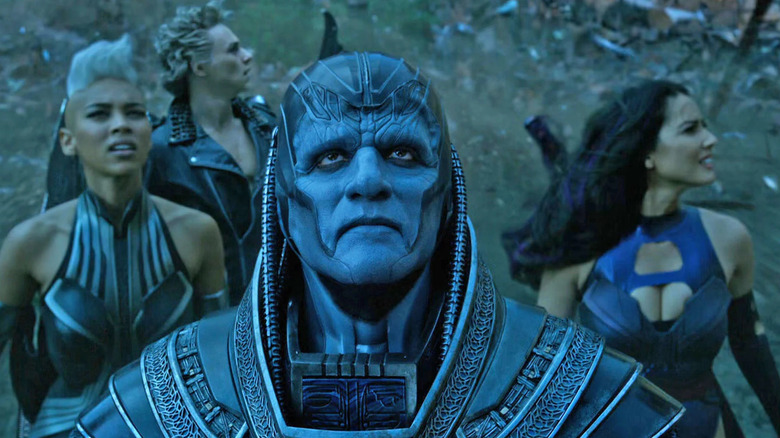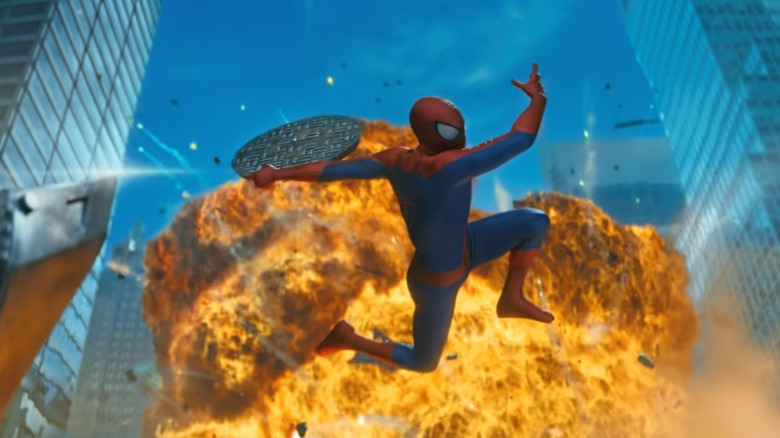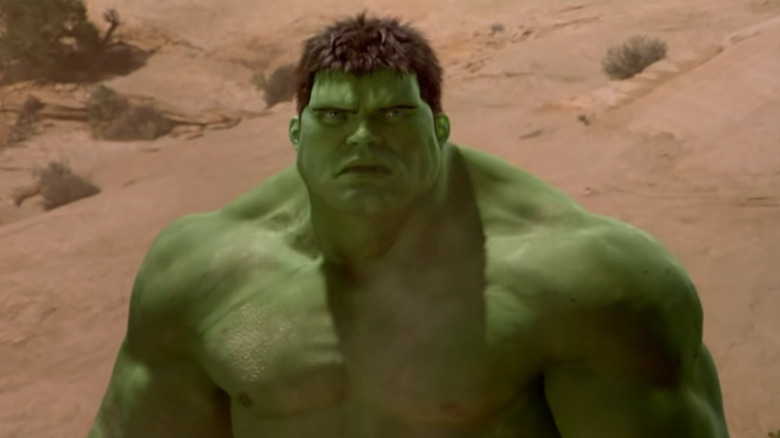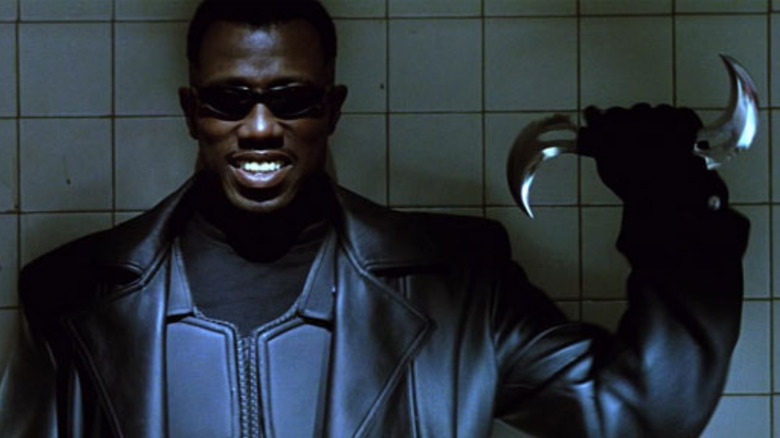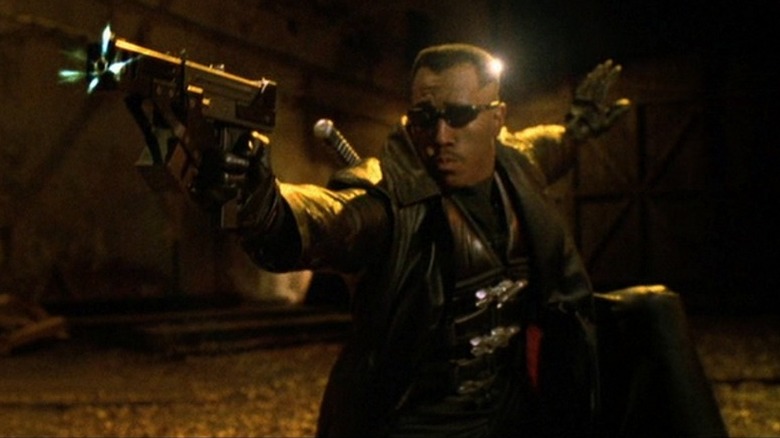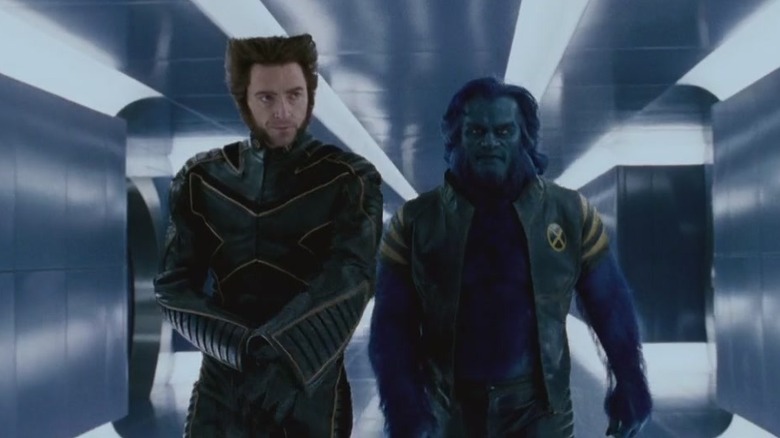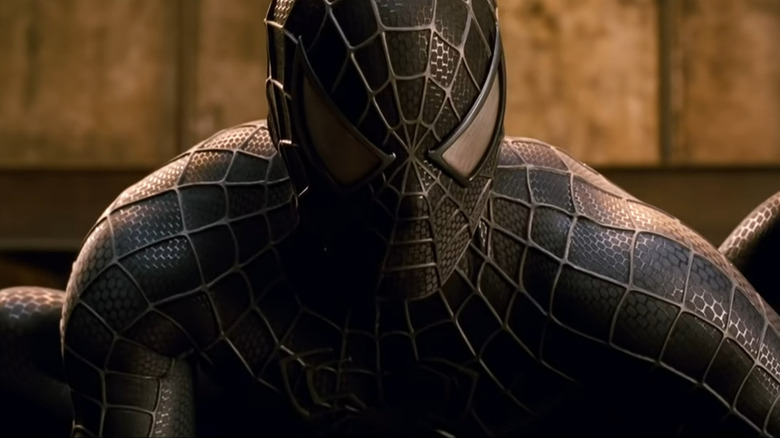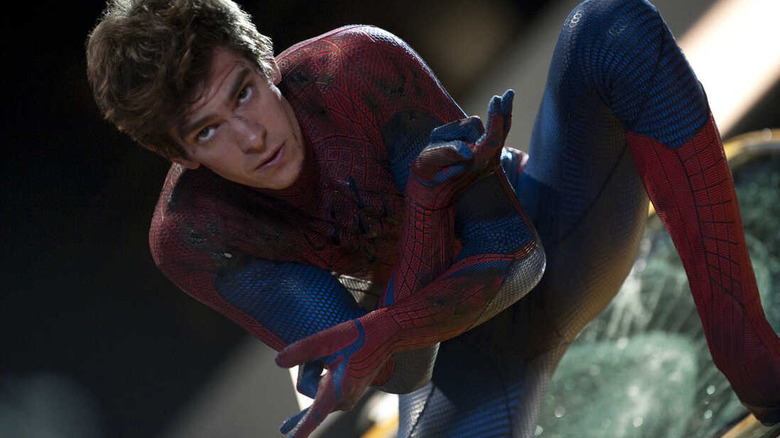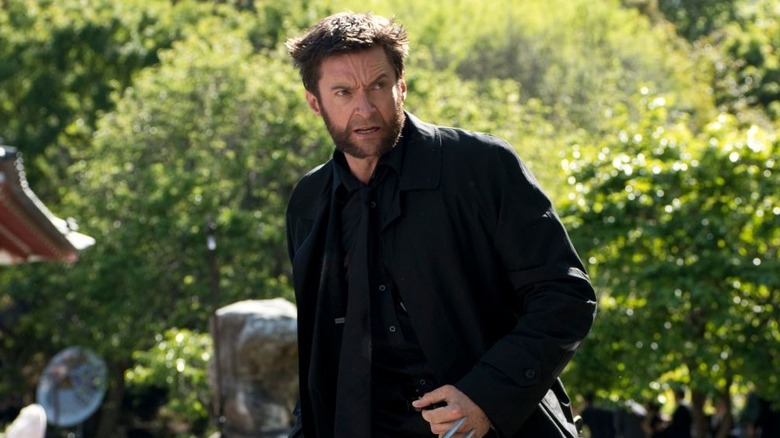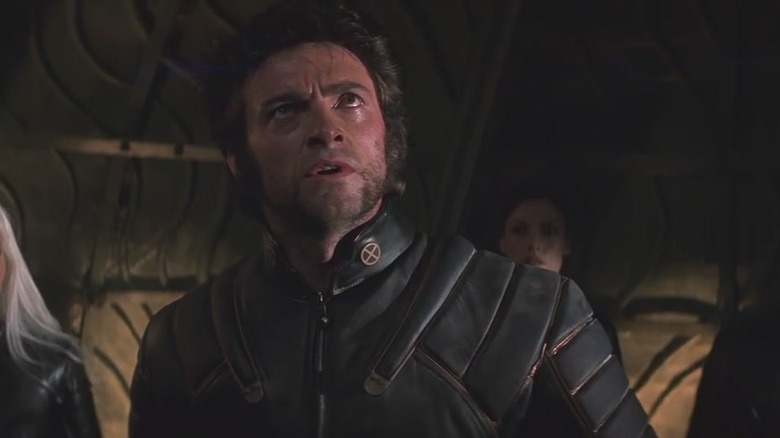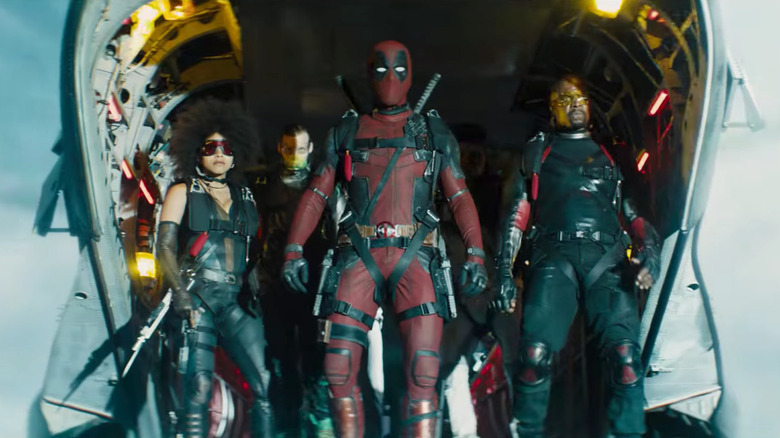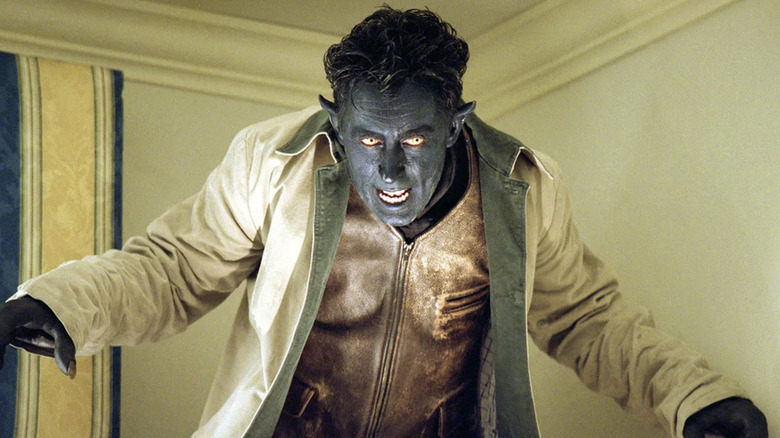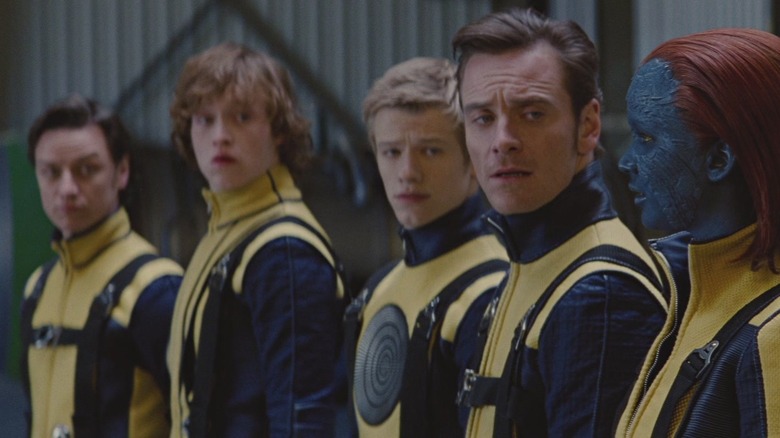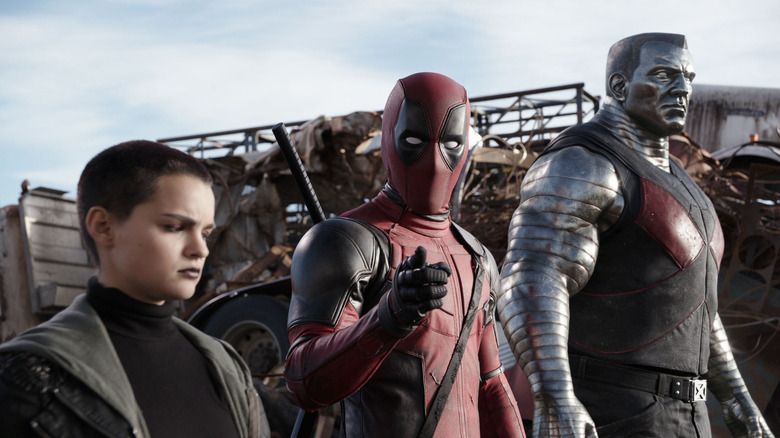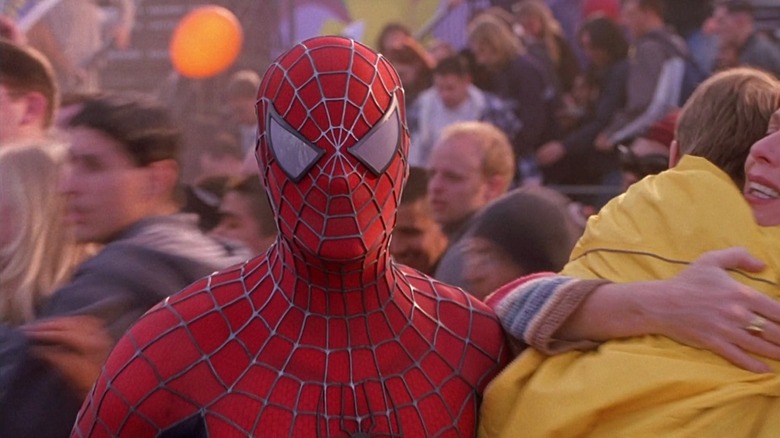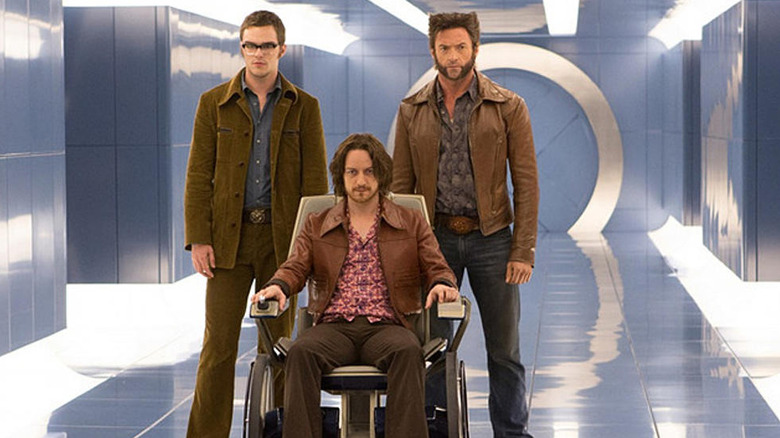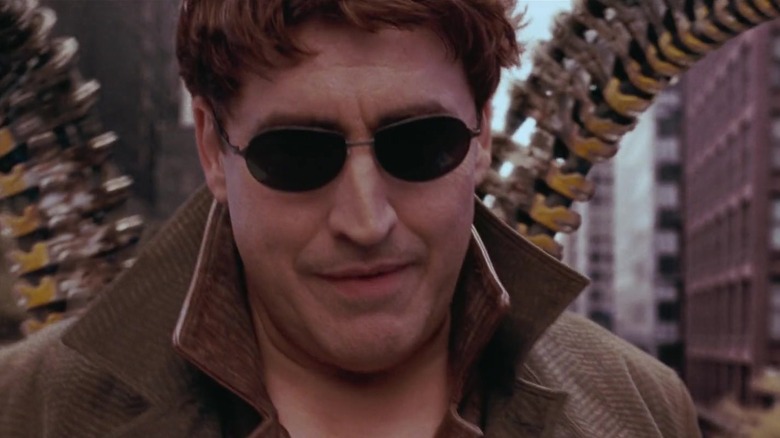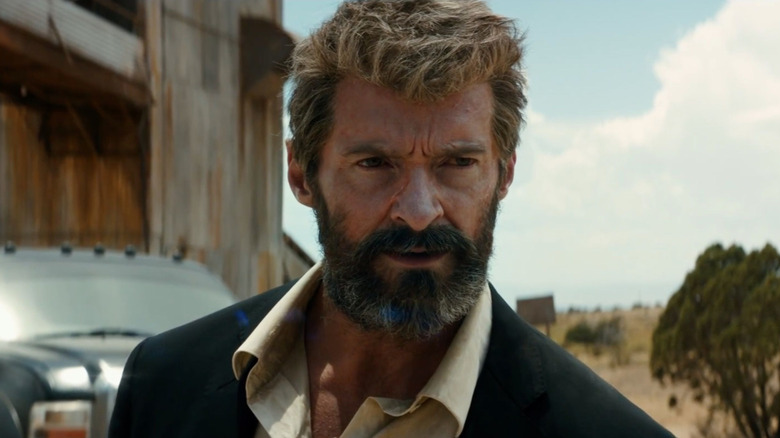Every Marvel Movie Not In The MCU, Ranked Worst To Best
Since 2008, when Marvel launched its own cinematic universe of films with the release of "Iron Man" starring Robert Downey Jr., the Marvel Cinematic Universe has been, bar none, Hollywood's biggest movie series. Since that time, it's grown from a handful of loosely connected films to a deeply rooted, complex web of movies, television series and streaming miniseries that form the perhaps the greatest media franchise of all time.
But what about the many Marvel movies that aren't part of the MCU? There are dozens of movies based on a variety of heroes that predate the founding of Marvel Studios. There are still more produced under deals signed with competing studios before the release of "Iron Man" as well. This includes Fox's "X-Men" universe of movies — which is now being rebooted since Fox's purchase by Disney in 2019 — and Sony's many earlier "Spider-Man" films. From the '80s through to today, from the best gritty action thrillers to the worst direct-to-DVD flops, here's every Marvel movie that's not in the MCU, ranked from worst to best.
50. Captain America (1979)
An obscure, lesser-remembered TV movie, "Captain America" aired on CBS in 1979, a year after "Superman" dazzled audiences on the big screen. It tries desperately to translate the Star Spangled Avenger for television but fails miserably. One look at it today and it's easy to see why, as the film looks more like a cheap Captain America knock-off than the genuine article.
Chasing popular '70s trends, "Captain America" turns the patriotic hero (played by Reb Brown) into something that more resembles a mix of Evel Knievel, Bo Duke, and John Baker from "CHiPs." He rides a souped-up motorcycle, drives a custom utility van, sports a massive helmet with goofy goggles, and wears a leotard that looks like a circus outfit. His shield is clear and operates as much as a frisbee as anything else. The plot doesn't matter, but in this version, he's the son of a World War II soldier whose nickname was "Captain America," and after ingesting a super serum he's hired by a scientist to become a superhero, battling a baddie with a bomb.
Strangely, despite the film being awful and barely recognizable as an adaptation of the comic, it might have influenced Captain America lore more than you'd expect: Following the movie, Cap in the comics adopted the use of a motorcycle and van. But while the film has its place in comics history, it's not worth watching at all; With so little connection to the comics, it's easy for us to rank it as the worst-ever Marvel movie.
49. Man-Thing
Overlooked at a time when other bigger comic book movies were hitting the big screen, "Man-Thing" was produced as part of an expansive deal Marvel made with Artisan Entertainment (before they were bought by Lionsgate) to produce a number of films based on their comics. This included "Black Panther," "Captain America," "Morbius," "Deadpool," and "Iron Fist," but while none of those made it past the drawing board under the deal, it seems that "Man-Thing" did.
Based on the 1970s supernatural monster comic that actually pre-dated the similarly themed "Swamp Thing" by two months — though both owe their existence to a golden age creature called "The Heap" – it was originally to have been a major theatrical release, but was eventually relegated to a direct-to-DVD/TV movie here in the United States. Telling the story of Ted Sallis, a man who becomes one with a mystical swamp, the effects were poor, the cast was unimpressive, and it failed to thrill or chill.
In the end, it's just a low budget indie movie, and a bad one even by those standards, and it's not cheesy enough to fall into the "so bad it's good" category, either. Made in Australia, even notorious Marvel producer Avi Arad was said to have lamented the foreign production which apparently lacked any oversight from the comic book company.
48. Captain America: Death Too Soon
CBS aired "Captain America" in 1979 as a prime-time movie of the week, kicking off a run of the worst Captain America movies you forgot existed, beginning with "Captain America: Death Too Soon." Reb Brown returns as Captain America, and though he's still riding a daredevil motorcycle, he does at least get an upgrade for his costume. He dons a much more comic-accurate outfit, though his shield remains mostly transparent and his helmet still looks awful.
This time around, producers make the odd choice to not have Captain America face off with a villain from the comics or even an enemy inspired by one of the hero's many classic villains. Instead, he matches wits with General Miguel (Christopher Lee), a diabolical terrorist from an unnamed country who wants to poison America's water supply. The poison, according to Miguel, will speed up the aging process in those who drink it, turning the entire population into elderly nursing home patients.
The one thing the film does have going for it that helps it rise just above the bottom of the barrel is the talent of horror icon Lee, who fans know best today as Saruman from "The Lord of the Rings." While it's hard to say which film is worse when they're both so bad, at least Lee and a better-looking Cap provide something here to look at.
47. Captain America (1990)
Spurred on by the success of "Batman" in 1989, it seemed everyone wanted to adapt a major comic book property, leading to a rash of films. A big screen adaptation of Marvel's iconic hero Captain America was originally intended as a big ticket summer blockbuster, announced with a thrilling theatrical poster. Instead, it was a goofy, cheap-looking movie that lacked all the excitement and action it aspired to, though it's not entirely without its own charms.
On the positive side, the Captain America costume was a pretty faithful adaptation of Cap's glorious red, white, and blue uniform — little temple wings and all — though an ill-fitting mask didn't do him any favors. It's also the first time that the character of The Red Skull was the result of the same experiment that created Captain America, a concept re-used in the MCU version decades later. Starring Matt Salinger — who is completely unconvincing as a strong heroic lead — Ned Beatty, and Ronny Cox, its failure probably set Marvel movies back by almost a decade. Unlike "Man-Thing," though, this is one that may be worth watching if you enjoy clumsy B-movies.
46. Howard The Duck
Produced by Lucasfilm and starring Lea Thompson and Tim Robbins, the 1986 film "Howard The Duck" was the first time Marvel had a heavily-marketed adaptation on the big screen. Not Spider-Man, the Hulk, or Captain America ... but Howard the Duck, who had starred in a lesser-known adult-oriented humor book in the 1970s.
The film had a decent cast and the right people behind it, but there was little that could save this disaster of a movie. Instead of a bombastic superhero, Howard is an awkward anthropomorphic duck from outer space who finds himself transported to planet Earth. Once in Cleveland, Howard befriends — and falls in love with — a young punk rocker named Beverly Switzer (Thompson).
While trapped on Earth, Howard becomes the manager of Beverly's band Cherry Bomb, before scientists reveal that their new invention is what accidentally brought him to Earth. But in an attempt to send Howard back, they bring the villainous Dark Overlord to Earth too. If that premise makes little sense to you, you're not alone, as it was a flop with critics, audiences, and at the box office. Despite a cast of veterans of '80s classics like "Back To The Future" and "Ferris Bueller's Day Off," and some top-notch puppet work, there's not much to love about "Howard The Duck." Especially not the awkward love scene between Lea Thompson and a man in a duck suit.
45. Elektra
A spin-off of the Ben Affleck version of "Daredevil," 2005's "Elektra" was a starring vehicle for Jennifer Garner that was somehow greenlit despite the previous film's poor reception. Also starring Goran Visnjic, Will Yun Lee, Cary-Hiroyuki Tagawa, and Terence Stamp as the sagely mentor Stick (who somehow didn't appear in Daredevil's own movie), "Elektra" brought back the deadly assassin for her own adventure. Risen from the dead in a revealing red corset, she now acts as an assassin-for-hire, with new superpowers that included precognition and the ability to resurrect the dead herself. No, we're not joking.
Hired by an enigmatic client to kill a mystery target, she soon meets and falls in love with Mark Miller (Visnjic) — who, along with his daughter Abby (Kristin Prout) — turn out to be her targets. Now Elektra must protect them from the deadly ninja cult The Hand, who are locked in an ancient war with a rival faction called The Chaste. Despite a strong cast and a big budget, Hollywood just hadn't figured out how to write a female superhero at this point. Instead of an exciting action movie, we got a watered down copy of another bad superhero movie. While "Elektra" is slickly produced, it's borderline unwatchable, with no charms at all.
44. Ghost Rider: Spirit Of Vengeance
Despite terrible reviews, the 2007 film "Ghost Rider" nevertheless was a modest hit, grossing more than $200 million. To the producers' credit, they clearly saw that there were problems with the film. So instead of forging ahead with a sequel straight away, they took their time to craft something with a new, darker, grittier, more in-your-face approach. But that's about where the positives end for this one.
Bringing back original star Nicholas Cage in a movie that's not quite a true sequel, the film reimagined the demonic bike-riding hero as a more sinister vigilante. With a new look and a new supporting cast (that included Ciarán Hinds and Idris Elba), "Ghost Rider: Spirit Of Vengeance" saw the hero Johnny Blaze doing battle with the devil over the soul of a young boy. With the promise that he will have his own soul restored, Johnny Blaze is asked to protect the child by a French monk, but soon finds himself locking horns with the devil's newest minion, Blackout, a gun-running mercenary turned demon.
It's an interesting starting point for a "Ghost Rider" tale, and the supporting cast does decent work. Unfortunately, the tone of the film went from gritty to goofy faster than Ghost Rider's hell-cycle, with Cage blaming its failure on the studio's unwillingness to embrace an R-rating. Roasted by critics even more than the first movie, and it killed the series for good, though the character would find later life on the ABC series "Agents Of SHIELD."
43. Madame Web
If you haven't seen "Madame Web" and are excited by the image above — showing a team-up of four iconic Spider-Women in comic-accurate costumes — we'll warn you right now that you should keep your expectations in check. Because while the costumes are on point and the production is solid, the film is easily the worst Marvel film that Sony ever produced.
Making the odd choice to base a "Spider-Man" spin-off on a character who even many fans of the comic aren't that familiar with, "Madame Web" casts "50 Shades of Grey" star Dakota Johnson in the title role. Sony makes drastic changes to the character, turning the blind, elderly Cassandra Webb into a beautiful young paramedic who happens to work alongside Peter Parker's Uncle Ben. When her superpowers begin to emerge she finds herself on a mission to stop a dangerous adversary named Ezekiel Sims (Tahar Rahim). Using her powers of clairvoyance, Webb works to stop Sims before he exacts his vengeance on a group of three other women who will one day become spider-based heroes like herself.
Downright cringe-worthy from the drop, "Madame Web" is an ill-conceived movie whose only value is as a punchline. Wasting a strong cast that includes Sydney Sweeney, Emma Roberts, Adam Scott, and Isabela Merced, the film spawned countless memes, going viral for all the wrong reasons. Audiences eviscerated the film even before it came out, and critics were no kinder. Even the cast regretted the film almost instantly, with star Dakota Johnson bashing her own movie almost as soon as it hit theaters.
42. Generation X
If you thought Fox's "X-Men" movie in 2000 was the first appearance of Marvel's merry mutants in live action, think again. In addition to the "Mutant X" series in the late '90s — one of many bizarre Marvel TV shows you've probably never seen — there was also the 1996 TV movie, "Generation X." It was adapted from a "X-Men" spin-off comic of the same name that debuted just two years earlier and introduced a new team of mutants, mixing fan favorites with several hot new heroes.
In the movie, the team consists of Jubilee (Heather McComb), Mondo (Bumper Robinson), M (Amaralis), Skin (Agustin Rodriguez), Buff (Suzanne Davis), and Refrax (Randall Slavin), while Emma Frost (Finola Hughes) and Banshee (Jeremy Ratchford) lead the team as headmasters at Xavier's School for Gifted Youngsters. They face off against an evil scientist, Dr. Russell Tresh (Matt Frewer), who wants to steal their brains so he can gain his own superhuman powers.
Just four years before the X-Men's big screen adventures would kick off, it's amazing to watch "Generation X" and think there was any promise of a blockbuster franchise to follow. Watching it now, it's a wholly abominable adaptation of Marve's mutant heroes, as it's really no better than a bad kid's cartoon translated into live action. The cast does what they can but they're given so little it doesn't amount to much.
41. The Death of the Incredible Hulk
The last of three TV movies that continued the story of David Banner from "The Incredible Hulk" TV series, "The Death of the Incredible Hulk" landed in 1990. In this one, Banner (Bill Bixby) discovers that the work of fellow scientist Dr. Ronald Pratt (Phillip Sterling) may hold the key to curing him of the condition that turns him into the Hulk. At the same time, forces sent by a foreign nation conspire to steal Pratt's work, which promises to grant subjects a superhuman healing factor.
While "The Death of the Incredible Hulk" jettisons the team-up concept from both previous TV movies — so we don't get an appearance from Ghost Rider or Iron Man, sadly — the story generally works, especially as it hews closer to themes of the show: Focusing on the journey of David Banner and his quest to rid his life of the curse of the Hulk.
Be warned, though, especially if you're used to more recent superhero TV shows: "The Death of the Incredible Hulk" is still not a high-quality production by today's standards, and may appear like a B-movie to modern eyes. It's also not as good as the long-running series itself; It's more like a below-average episode of the show than a movie-worthy story. Nevertheless, it's worth checking out for those who want a glimpse at how far we've come in the world of comic book TV.
40. The Incredible Hulk Returns
A year after the success of DC's "Wonder Woman" TV show in 1976, Marvel responded with "The Incredible Hulk," a live-action drama starring Bill Bixby as David Banner, with professional bodybuilder Lou Ferrigno in green body paint portraying his monstrous alter-ego, the Hulk. After a wildly popular five seasons, the show came back with a series of TV movies beginning with "The Incredible Hulk Returns" in 1988 — and Hulk brought a friend with him.
When the movie picks up, Banner has been living under a new name, David Bannion, when he's recognized by an old friend, Donald Blake (Steve Levitt). We soon discover that Blake possesses a magical hammer that can summon the Norse God named Thor (Eric Allan Kramer). Soon, the Mighty Thor and the Incredible Hulk are forced to reluctantly team up to take down a gang who are determined to steal a piece of powerful new technology that Banner has been working on.
It won't win any awards, but "The Incredible Hulk Returns" is a fun little adventure with a simple story that recaptures the spirit of the former show while still having its own flavor. The appearance of Thor — and the story's suggestion that he could become an everyday hero — made it an obvious backdoor pilot for a "Thor" series. While that never came to fruition, the film can now be seen today as an important stepping stone toward the MCU, as it was the first time two major Marvel heroes shared the screen in live-action.
39. Morbius
"Morbius" was the next film in Sony's "Spider-Man" universe to go beyond the webslinger's immediate family of characters after the studio found some success with "Venom." Unfortunately, "Morbius" couldn't match the former's big box office dollars, nor even its mediocre critical reception. A true flop, the film seems to prove once again that without Marvel Studios' help, Sony continues to have no idea what to do with their corner of the Marvel universe.
Starring much-maligned thespian Jared Leto, "Morbius" tells the story of a scientist working on a cure for a debilitating genetic disorder who inadvertently turns himself into a blood-sucking vampire. Not quite a villain, not quite a hero, he now possesses an array of tremendous super powers including enhanced strength, stamina, healing, and a bat's uncanny echo-location. Pursued by the FBI, Morbius discovers he's not the only one who has gained vampiric powers, setting him up for what was surely intended to be an epic final showdown.
Sadly, the movie was lambasted for its lameness, and for being more reminiscent of early 2000s superhero movies than anything from the MCU. It has surprisingly bad effects, hammy acting, and a nonsensical plot, including a bizarre post-credits scene that haphazardly attempts to tie it into the MCU "Spider-Man" films. Looking back at this oddity now, it was a bad omen for Sony's "Spider-Man" universe.
38. Nick Fury, Agent of SHIELD
Two years after Fox aired "Generation X," the network adapted Marvel's best spy series, "Nick Fury, Agent of SHIELD." At the height of his "Baywatch" fame, star David Hasselhoff slipped on the eyepatch to play the titular super-spy, who works for the government's most top-secret intelligence agency. Alongside a team of trusted agents, Fury works to put an end to the schemes of Hydra, a terrorist group that's been menacing the globe for decades.
Though nobody will call this a Marvel great, there are a few elements that raise the 1998 movie's profile. For starters, the script is penned by David S. Goyer, who'd later write such superhero favorites as "Blade" and "Batman Begins," as well as serving as producer and contributing writer on the Netflix adaptation of Neil Gaiman's "Sandman." One thing the movie gets right, too, is populating its cast with minor characters from the comics, like Alexander Pierce, Dum Dum Dugan, and Clay Quartermain, while the villains are the infamous Baron Strucker (Campbell Lane) and the evil genius scientist Arnim Zola (Peter Haworth). This helped set a precedent that would be followed by future Marvel movies.
Still, for all it has going for it — including a solid production, a decent cast of actors, and some fun TV-level action — "Agent of SHIELD" isn't very good. But it did help refine the Marvel movie formula, and Hasselhoff does the part justice. So much so that we're hoping he's one of the old live-action Marvel heroes who will show up in the MCU's Multiverse Saga.
37. Kraven the Hunter
The success of 2018's "Venom" had Sony thinking it could launch a shared universe of Spider-Man-adjacent films that didn't include Spider-Man, so the company began greenlighting movies left and right. Unfortunately, outside of the "Venom" films, none of them were any good and all of them were disasters for the studio, critically and commercially. Even after "Morbius" and "Madame Web" bombed out of the gate, there was still one more in production: "Kraven the Hunter."
Former "Avengers: Age of Ultron" star Aaron Taylor-Johnson plays Sergei Kravinoff, a big game hunter who gains superpowers from a voodoo priestess. Armed with deadly weapons and abilities beyond those of mortal men, Sergei goes on the hunt for an infamous drug lord who just happens to be his own father, Nikolai Kravinoff (Russell Crowe). To its credit, the film looks good despite some wonky character design, and the top-billed cast is a good one. But once again, Sony wastes anything it has going for it with a contrived, overly complicated script about an iconic Spider-Man villain at its center and no Spider-Man to battle him ... with none of it really working at all.
A massive box office bomb — barely even able earn back half of its mammoth budget — Sony execs doubled down after it flopped, insisting it was a good movie that simply didn't succeed at the ticket counter. While there may be some truth to that assessment, as audiences gave the film soft praise for its action sequences, it still ranks among the worst movies outside the MCU.
36. The Trial of the Incredible Hulk
Perhaps the best entry that the Bill Bixby-led series ever had to offer, "The Trial of the Incredible Hulk" was the second of three TV movies, airing in 1989. Not only does it serve up action and drama, it also sees the debut of another Marvel superhero, with actor Rex Smith portraying Matt Murdock, David Banner's defense attorney. By night, of course, the blind lawyer suits up as the vigilante called Daredevil.
In the movie, Banner is arrested after turning into the Hulk on a city subway. Murdock is assigned to be his attorney, but when it turns out that Hulk was only defending a woman from an attack by thugs working for a notorious crime lord, he must team up with the Hulk as Daredevil to stop the murder of a witness.
While audiences at the time may have winced at Daredevil's ninja-like costume, ditching the iconic red outfit, it worked in an era when translating comic-accurate costumes wasn't so simple. The all-black costume was also the basis for his look in Frank Miller's "Daredevil: Man Without Fear" series, which became a beloved look for the blind crimefighter in Netflix's 2015 series. It's a by-the-numbers story limited by a late '80s TV movie budget, yet it still makes some pretty good choices, including the casting of John Rhys-Davies as Wilson Fisk, aka Kingpin. Meanwhile, the film is also notable for the first-ever of Stan Lee's many movie cameos, with the Marvel architect playing a member of a courtroom jury.
35. Ghost Rider
Long a fascination of Hollywood producers, who'd been eyeing the comic book hero for more than a decade, a big budget "Ghost Rider" movie finally landed in 2007. Nicholas Cage, who'd been circling superhero roles for nearly as long, finally found his franchise, taking on the role of Johnny Blaze — a daredevil motorcycle rider who strikes a deal with the literal devil to save his father's life. Now, Blaze is cursed to walk the Earth as a demon with a flaming skull. Co-starring Eva Mendes, Wes Bentley, and Sam Elliott, it's yet another disappointing Marvel project that featured a strong cast.
In the film, the devil comes back to Blaze with a new deal: he'll give him back his soul, and free him from the curse of the Ghost Rider, if he can defeat his son Blackheart (Bentley). Intent on letting the demons of hell run loose on Earth, Blackheart has recruited three fallen angels to his side. Blaze — now armed with his powerful penance stare, and aided by his predecessor (Elliott) — must use his newfound fiery power to defeat them all and regain his lost soul. With a PG-13 rating, the film failed to capture the visceral horror and grim tone of the flame-wielding bounty hunter. Still, it did serviceable numbers at the box office, enough that it enticed the studio to try again four years later.
34. Punisher: War Zone
The third attempt to get "The Punisher" right on the big screen, "Punisher: War Zone" is somehow the worst of the three films that feature Marvel's gun-toting vigilante, despite both previous films getting at least some of it right. While the first wasn't enough "Punisher" and the second was a bit too tame, this one strikes all the wrong notes, with borderline campy action and a paper thin plot that doesn't stack up to even the worst of generic action movies. Star Ray Stevenson does perhaps the most faithful interpretation of Frank Castle to date, but is unfortunately given little to work with, and the result is a movie that bombed from every angle.
In the film, Frank Castle sets out to wage his never-ending one-man war on crime in New York City, facing down street thugs and mafia bosses alike. He's looking for revenge for the death of his family, and faces off with his classic comic book nemesis, Jigsaw (Dominic West). Despite being made in 2008, after Marvel Studios had shown them how to do comic books movies right, there's little to like about this one. Of course, if all you're looking for in a "Punisher" movie is copious amounts of graphic blood and gore, this one should satisfy you. Thankfully, the character would finally be done justice thanks to Marvel's deal with Netflix just a few years later.
33. The Fantastic Four (1994)
One of the most famous unseen movies in Hollywood history, the 1994 adaptation of Marvel's "The Fantastic Four" was produced by schlock auteur Roger Corman. Made on a shoestring budget only so the studio could fulfill a contract and keep the rights, it was never intended to be shown in theaters, though nobody on the production knew that at the time. Like its comic book counterpart, it tells the origin story of four friends who venture into outer space and are granted incredible super powers. Suiting up as a superhero team, they clash with the metal-suited tyrant Doctor Doom.
Despite its lofty goals, it never made it to theaters, and was never officially released. For decades, bootlegs of the film circulated, turning it into a genuine cult classic B-movie. But a hackneyed script and downright awful effects made it a chore to sit through, even for the most determined fans.
Still, it's clear that it was made with earnestness by the filmmakers and especially the cast, who you can tell are putting their heart and soul into the movie. That, combined with the fascinating history of the film and its place in Marvel's ascent to Hollywood dominance, make it worth watching as a curious historical relic. If you're not up for sitting through the film itself, consider the documentary about its production, "Doomed: The Untold Story of Roger Corman's the Fantastic Four."
32. Blade Trinity
The first "Blade" film burst onto the scene with a combination action and horror, something fresh and new for audiences. The first movie based on a Marvel comic in nearly a decade, the 1998 film was followed by a sequel from visionary director Guillermo del Toro, which built off the first film's success. But a third film in the trilogy couldn't quite match the uniqueness of the first two, and "Blade: Trinity" slipped into farce. Full of action movie tropes, and with a cast who seem like they are just going through the motions — save for Ryan Reynolds, who seems to enjoy hamming it up — it all adds up to one of the more disappointing movies on this list.
More than an embarrassment for Marvel, even Wesley Snipes himself had problems with the final product, resulting in a legal feud between him and the studio. Of course, that wouldn't be the worst of it, as reports soon began circulating of the actor's despicable behavior during production, with allegations that have dogged him for years.
Though the first two films were no award-winners, they were fun action pictures that more than satisfied the target audience. Unfortunately, the lackluster third entry marked a sad low end to the promising "Blade" trilogy.
31. The Punisher (2004)
By 2004, it had been 15 years since Hollywood had attempted a movie version of "The Punisher." With revenge action movies as popular as ever, and comic book heroes doing big bucks on the big screen in the early 2000s, it probably seemed like the perfect time to try again.
This new version, starring Thomas Jane, would be largely inspired by the then-recent comic book run written by celebrated scribe Garth Ennis (creator of "Preacher"). With Jonathan Hensleigh at the helm — whose resume included "Die Hard With A Vengeance" and "Armageddon" — it seemed like this time Hollywood might finally get the character right.
The film tells the origin story of undercover FBI agent Frank Castle. His family is killed in a mafia hit after criminal kingpin Howard Saint discovers his identity. Thought dead along with them, Castle instead returns as a vengeance-seeking vigilante, armed to the teeth and looking for blood. While "The Punisher" is a compelling version of the character, it largely lacks the grim, dark tone that Frank Castle's story requires. It seems the studio, despite the R-rating, wasn't ready to head down such a bleak path. Even though Jane himself became a fan-favorite in the role for his intense performance, the movie disappointed and led to two reboots over the course of the next decade.
30. X-Men: Dark Phoenix
The final film in Fox's nearly 20-year-long "X-Men" saga, "X-Men: Dark Phoenix" sent the franchise out on a low note. Wasting a perfectly good cast, with Jessica Chastain joining the film as the villain, the film tells the story of the Dark Phoenix ... which had been told already in the 2006 film "X-Men: The Last Stand." This version is a wild departure, though not really much more faithful to the comics than the first time around. It did include an outer space alien component, but it doesn't provide the kinds of strong character drama and relatable emotional beats that the best of the X-films had done so well.
In this version, the X-Men head into space where telepath Jean Grey (Sophie Turner) is possessed by the cosmic Phoenix force. Turned into a diabolical weapon by a race of alien planet-conquerors, the X-Men must come back together to save the world and their friend. Rumors swirled that the film was altered late in development after the MCU's "Captain Marvel" was announced to avoid comparisons, and that Disney's purchase of Fox led the studio to make even more changes to the project. Whatever the reason, "X-Men: Dark Phoenix" wasn't just the last proper "X-Men" film from Fox ... it was also the worst.
29. The New Mutants
We toyed with putting this one below "Dark Phoenix," especially as we described that film as the worst "X-Men" film from Fox. But ultimately "New Mutants" is just slightly ahead of the final "X" affair, and in truth, is not really an "X-Men" film at all. Produced by Fox before their merger with Disney, and delayed multiple times for a variety of different reasons, "The New Mutants" was a unique film that had more in common with the supernatural horror hit "Stranger Things" than superhero comic book adventure films — even including one of that show's many stars.
The movie was loosely adapted from the acclaimed comic book run by Chris Claremont and Bob McLeod. It introduced five young mutants — Mirage, Wolfsbane, Cannonball, Sunspot and Magik — as they told their stories to Dr. Cecilia Reyes. Held in a secret facility ostensibly for the purpose of curing them of their dangerous mutant powers, their visions soon come to life and threaten to kill them all. Its fresh concept as a supernatural thriller gets it some credit, but the much-hyped film was a big disappointment, considering how long it had waited to be seen.
28. Fantastic Four (2005)
More than 10 years after the low-budget adaptation from Roger Corman, "The Fantastic Four" got the big budget, big screen treatment in the wake of the success of Sony's "Spider-Man" films. Starring Ioan Gruffudd, Jessica Alba, Michael Chiklis, and Chris Evans, the film had a strong cast, top-notch special effects, and told the origin more or less correctly, with the four friends venturing into space and receiving incredible powers: Ben Grimm becomes the super-strong Thing, Sue Storm can turn invisible, Reed Richards can stretch his body to ungodly proportions, and the hotheaded Johnny Storm can "flame on" and shoot fire from his fingertips. Together they battle the villainous Doctor Doom (Julian McMahon), a former rival of Richards', now with his own powers and bent on destruction.
The film was colorful, upbeat, and adventurous, striking the perfect tone for the comic book adaptation of Marvel's first super-team. Unfortunately, the story left a lot to be desired, and the performances were a bit too hokey in places. While it was easy to enjoy as a light-hearted romp, it still didn't deliver the high octane comic book action that fans had come to expect from recent "X-Men" and "Spider-Man" films.
27. Venom
The first movie to come out under the banner of the Sony Spider-Man Universe, the 2018 action horror movie "Venom" starred Tom Hardy in the title role. Heading into darker, more mature territory than ever before, the film looked to be a real treat for comic book fans looking for a better take on the character than Topher Grace's incarnation from "Spider-Man 3."
The solo movie told the story of downtrodden reporter Eddie Brock (Hardy), whose encounter with an alien symbiote turns him into the flesh-eating monster Venom. Together they form a contentious relationship and become a force to be reckoned with, vowing to chomp on evil-doers. But soon, Brock and his alien partner find themselves going up against the Life Foundation — the group had discovered the alien creature — and battling its newest and deadliest creation.
A big budget barn-burner, it lit up the box office, taking in a whopping $856 million during its run. Full of just the right amount of over-the-top action, violence, and gore that fans had been craving, it was a genuine crowd-pleaser. But looking past the visual delight, "Venom" simply doesn't have much to offer in the way of a powerful or satisfying story. It also suffered from its lack of connections to the wider "Spider-Man" universe, turning out to be little more than a loud, mindless romp. But if that's what you're looking for, you'll love it.
26. Fantastic Four (2015)
With Marvel Studios' MCU off and running, Fox wanted to revive its "Fantastic Four" franchise and capitalize on the public's hunger for superheroes. But its previous Johnny Storm (Chris Evans) was now playing Captain America, and it had been almost 10 years since the previous film had underperformed. A new reboot went on the drawing board instead, with an all-new cast that included Michael B. Jordan, Miles Teller, Kate Mara, and Jamie Bell, with Toby Kebbell as Doctor Doom.
Young indie director Josh Trank had in mind a horror-inspired new take on Marvel's First Family. He wanted to make a more grounded, realistic, and grittier vision that saw the four young adults discover an alternate dimension that inadvertently gives them super powers — including their friend Victor Von Doom, who uses them for evil.
In perhaps one of the worst cases of a studio completely bungling a movie, Fox butchered Trank's concept and reshot much of the film with a different director (executive producer Simon Kinberg). While Trank's darker, grittier version of the "Fantastic Four" may have been misguided, we'll never know what could have been had he actually been able to see it through. As it stands, there's some intriguing ideas and some compelling drama, but the potentially interesting film completely falls apart in the second half. The reshoots are infamously obvious, thanks to some bad green screen effects and an oddly chosen blonde wig for Mara's Sue Storm.
25. Fantastic Four: Rise Of The Silver Surfer
A step up from its predecessor, the 2007 sequel "Fantastic Four: Rise Of The Silver Surfer" added a major Marvel character to the mix. Voiced by Laurence Fishburne and played by Doug Jones, the Silver Surfer gave the film an exciting new quasi-villain to pair with the returning Doctor Doom, who seeks to control the cosmic power wielded by the newly arrived alien.
But the Silver Surfer is more than a mere foe. He arrives as a harbinger of the world's end as the herald of his master: the being known as Galactus, who is on his way to devour the planet. The Fantastic Four suit up once again to stop the Surfer's path of destruction, and square off with Doom to prevent the alien's power from falling into his hands.
A marked improvement over the first movie, the deepening of the "FF" lore served the film well, and the cast did even better work the second time around. But once more, the story and effects don't come across as particularly exciting. Likewise, the changes made to Galactus fall completely flat, even for audiences unfamiliar with the source material. It's not quite a bad film, and there's plenty to love, but "Rise Of The Silver Surfer" once again feels like a big wasted opportunity for some of Marvel's best characters.
24. Daredevil
After the overwhelming success of Sony's "Spider-Man" and Fox's own "X-Men" films, the latter studio went back to the Marvel well and gave audiences the long-awaited big screen debut for one of its biggest heroes: Daredevil, the Man Without Fear. Fresh off his turn as Jack Ryan in "The Sum Of All Fears," rising action star Ben Affleck dons the red cowl as the title hero, whose alter ego Matt Murdock is a passionate but blind lawyer. Joining him are Jennifer Garner and Colin Farrell as antagonists Elektra and Bullseye respectively, as well as Jon Favreau as Matt's law partner Foggy Nelson.
Adapting both Daredevil's origin story, as well as elements from some of the character's best runs, the film seemed to run through Daredevil's greatest hits, rather than tell a single, compelling story. Despite some good performances and decent stuntwork, the film simply isn't as dark as it clearly wants to be, never fully embracing the seriousness of the gritty source material it's adapting. Thankfully, an extended director's cut helped smooth out its rough edges, but it still didn't do justice to the character's rich comic book adventures. Like "The Punisher," it would be rebooted a decade later with a much more faithful Netflix series.
23. The Punisher (1989)
The first theatrical movie to be based on a Marvel hero after "Howard The Duck," 1989's "The Punisher" was also the first adaptation of the character for the screen. Starring "Rocky IV" villain Dolph Lundgren, it tells the story of Frank Castle, a former police detective who was thought dead in the Mafia hit that killed his family. Bitter, resentful, and full of bloodthirsty rage, Castle makes it his personal mission to strike back against the city's biggest criminals. Known to the underworld as the Punisher, he does serious damage to a number of crime families, and now has his sights set on the Yakuza — the Japanese criminal enterprise that's infiltrated New York.
Though the film is not the most faithful adaptation of the character — he lives and broods in a dank sewer and lacks the signature skull graphic on his chest — it operates more as an average action film for its day. Of course, fans may have wanted something dark and violent, but the movie is bleak and grim to the point of being depressing. Lundgren is a satisfying Punisher in places, but the film is mostly let down by a clichéd story and lame action scenes. Little of it lives up to what audiences had come to expect from other, better revenge films in the '80s. As a relic of an older time, though, it's become a cult favorite.
22. Dr. Strange
It may be a surprise for some, but the 2016 MCU entry "Doctor Strange" wasn't the first time Marvel took a stab at a film based on the Sorcerer Supreme. Way back in 1978, "Dr. Strange" aired on American TV screens as an event film in prime time. Though it was initially produced as something of a TV series pilot, that concept was seemingly dropped by the time it aired as a feature-length film.
Starring Peter Hooten and Jessica Walter (later known for her role as Lucille Bluth in "Arrested Development"), as well as "Star Trek" veteran Michael Ansara as the voice of the Ancient One, the film follows Dr. Stephen Strange from his humble beginnings to his training as Master Of The Mystic Arts. The film takes quite a few liberties from the character's comic book origins, though. In this version, Strange (Hooten) is a leading psychiatrist. He tries to help a troubled young woman named Clea Lake, who is under the influence of the medieval spellcaster Morgan Le Fay (Walter). A mysterious man comes to help him treat Clea, revealing he is a powerful wizard who has been battling LeFay for years — and, after training Strange in the ways of magic, passes him the mantle of Sorcerer Supreme.
Though certainly a flawed film, if you can look past the dated production — including Hooten's glorious 1970s perm — and the notable differences from the comics, "Dr. Strange" is a lightweight fantasy adventure that should delight diehard fans of Marvel's resident wizard.
21. X-Men Origins: Wolverine
Following three hit "X-Men" films, where Hugh Jackman proved a standout as the hero Wolverine, Fox finally gave him his own film. 2009's "X-Men Origins: Wolverine" took a trip back in time to show how Logan became the famed mutant with unbreakable claws. An opening montage shows a young boy named James Howlett and his half-brother Victor Creed in the 19th century, as they grow up to serve in the American Civil War, both World Wars, and Vietnam.
Eventually the two brothers are recruited by a mysterious military man named Stryker (Danny Huston). James (Jackman) takes the codename Logan as they join an elite team of mutant commandos called Team X. But when Victor (Liev Schreiber) goes rogue and kills Logan's only love, he must help the team hunt down his own brother. To do it, he undergoes the experimental procedure that bonds the unbreakable alloy adamantium to his bones.
"X-Men Origins: Wolverine" has plenty of thrilling action set pieces and some intriguing new characters, but disappoints with lackluster CGI, a clumsy story, and confusing connections to the larger "X-Men" universe. Though notable for featuring Ryan Reynolds' first appearance as Wade Wilson — later known as Deadpool — the character was butchered for the film and bears absolutely no resemblance to the character he'd bring to life almost a decade later.
20. Venom: The Last Dance
"Joker: Folie à Deux" isn't the only comic book villain sequel in 2024 to feature a rousing musical dance number for its titular baddie. "Venom: The Last Dance" does it too, but thankfully the threequel limits it to one humorous sequence that actually works for a laugh. Opting for something far less pretentious than the Joaquin Phoenix sequel, Tom Hardy's third "Venom" outing is, like its predecessors, a dark action-comedy. And this one goes full bonkers.
"The Last Dance" sees Venom facing the same situation Spider-Man did in "Far From Home," as he's been framed for a crime he didn't commit and finds himself on the run attempting to clear his name. This time, though, the toothy anti-hero is battling dark government forces, as well as the agents of an evil space tyrant called Knull (played by Andy Serkis, who directed the previous effort).
Written and directed by Kelly Marcel, who wrote both previous films, "The Last Dance" is a step up in terms of production and story, with bigger, bolder choices. As is customary for the trilogy, the critical response was harsh but audiences ate it up. Some of it doesn't work, some of it does, but it's the movie's irreverent attitude and playful grit that once again elevates the proceedings.
19. Venom: Let There Be Carnage
Even if the first "Venom" film in 2016 wasn't loved by critics, its massive haul at the box office was more than enough to earn it a sequel. Woody Harrelson had already teased the villain Carnage, and with Tom Hardy back on board and Andy Serkis recruited to direct, it had all the ingredients for another smash success. And a hit it was, though thanks partly due to the changing landscape of theatrical releases in 2021, it couldn't come close to the first film's take. Still, "Venom: Let There Be Carnage" gave audiences exactly what they wanted out of a sequel: a bigger and crazier villain, bigger stakes, and bigger and bloodier action.
In the film, reporter Eddie Brock (Hardy) gets an interview with convicted serial killer Cletus Kasady (Harrelson), and unwittingly gives him a portion of the Venom symbiote. Merged with the deranged madman, they become the homicidal supervillain Carnage, and it's up to Brock and his Venom personality to work together to stop his reign of terror. "Let There Be Carnage" is mostly mindless chaos and violence, and in that it succeeds. But its thin characters and a thinner, unimaginative story make it a chore to sit through if you're looking for anything more. A clever don't-miss post-credits stinger sets the series up for a clash with the MCU's Spider-Man.
18. X-Men: Apocalypse
Just two years after the success of "X-Men: Days Of Future Past," director Bryan Singer once again returned to the helm and expanded the world of mutants once more. "X-Men: Apocalypse" went further down the rabbit hole of X-Men lore, introducing the ancient being known as Apocalypse (Oscar Isaac), who is said to have been mankind's first mutant. Worshiped and revered, he returns in the present day and recruits four powerful mutants to his side to bring about the end of the world — including the X-Men's fiercest foe, Magneto (Michael Fassbender).
Facing a diabolical threat unlike anything they've seen before, the X-Men regroup — with the help of a new team of young mutants — to stop Apocalypse and his four horsemen. Though it gets credit for its ambitious premise, "Apocalypse" was a big letdown, especially considering how beloved the previous film in the series had been just a couple of years before. Instead of the gripping, dramatic story and engaging characters we got in "Days Of Future Past", its sequel devolves into straight action schlock.
Ultimately, it's a film that looks great on paper but doesn't translate to the screen. But another memorable slow-motion Quicksilver (Evan Peters) set piece helps bump this one up a little higher on this list. If all you're looking for is slick, big-budget mutant action, on a bigger scale than we've ever seen, this one is for you.
17. The Amazing Spider-Man 2
The sequel to the 2012 reboot "The Amazing Spider-Man," Andrew Garfield's second outing as the webslinger was in some ways an improvement over the first installment. Spidey is back in action, saving New York City from evildoers — including an emerging threat known as Electro (Jamie Foxx), a down-on-his luck technician who's granted superpowers when he falls into a tank of electric eels. And when his best friend Harry Osborn (Dane DeHaan) becomes a twisted goblin baddie himself, Peter Parker uncovers a vast conspiracy in the Oscorp labs. All the while, Peter continues to struggle balancing his superhero life with his ordinary one, where he is trying to salvage his relationship with Gwen Stacy (Emma Stone). This is made more complicated when she gets caught in the middle of his battle with various villains.
While it certainly looked better — the movie was more colorful, Spider-Man wore a much more comic-accurate costume, and it boasted more fluid and dynamic visuals — the sloppy, mish-mashed plot brought the whole endeavor crashing down. There's quite a few bright spots in the movie, but not enough to keep it afloat, and despite pulling in some serious box office numbers, it was a disappointment for the studio. One silver lining though: its lack of success partially led to Sony's deal with Marvel, and the introduction of Tom Holland in the MCU as a newly rebooted wallcrawler.
16. Hulk
For the Hulk's 2003 big screen debut, Universal and Marvel went outside the box and tapped Hong Kong director Ang Lee ("Crouching Tiger, Hidden Dragon") to bring Bruce Banner and his big green alter ego to life. Eric Bana starred as Banner, with Jennifer Connelly playing Betty Ross, and Sam Elliott (in the first of two Marvel roles) starring as her father (and one of several antagonists in the film) General "Thunderbolt" Ross. Following the accident that turns him into the Hulk, Banner finds himself hunted by Ross and the U.S. military, all while contending with his father (Nick Nolte) — a scientist once allied with Ross — who now possesses powerful abilities of his own.
Ang Lee brought a certain gravitas to the project, attempting to turn the story of Bruce Banner into something of a Shakespearean tragedy. When it works, it really works, and the film's stellar cast do some excellent work. But Lee's insistence on turning the visuals into a comic book farce lets the film's ambitions down, with odd CGI that turns the towering Hulk into an oafish cartoon character in parts. Meanwhile, a clunky final act and a murky battle with a nebulous villain leaves much to be desired.
15. Blade
Thanks to a deal between Marvel and indie studio Lionsgate, audiences got an adaptation of the supernatural horror-action comic series "Blade: The Vampire Hunter." The 1998 film — titled simply "Blade" — featured action star Wesley Snipes not long after his '90s hits "Demolition Man" and "U.S. Marshals." Before movies like "The Matrix," it was "Blade" that set the standard for fast-paced kung-fu action in America, complete with black leather jackets and a rapid-fire techno-driven soundtrack.
The story begins with half human, half vampire Eric Brooks — aka Blade — serving as a vampire hunting mercenary. Along with his sidekick Whistler (Kris Kristofferson), the hero tracks and hunts the newly emerged vampire leader Deacon Frost (Stephen Dorff), who seeks to eliminate the human race by summoning forth an ancient evil. Dated today, it was an impressive roller coaster ride at the time.
The influence of the film cannot be overstated either, as it was more than just a trendsetter in tone and style for late '90s action movies that would follow. "Blade" also proved to Hollywood that a relatively obscure superhero, with a charismatic star and some clever, fast-paced action, could become a big hit with audiences.
14. Blade II
When a superhero action movie ends up a surprise hit, you can bet you'll get a sequel, and that's exactly what happened with "Blade." With a new director in the form of future "Hellboy" helmer Guillermo del Toro, "Blade II" came out from the shadows and bit the necks of audiences everywhere in 2002.
Like any good sequel, the good got better, including even more impressive action and a number of names added to the cast including Ron Perlman, Norman Reedus, and Donnie Yen. It also introduced a new enemy — neither human nor vampire, but mutant "Reapers" who threaten both. In the film, Blade makes an uneasy alliance with vampire lord Eli Damaskinos (Thomas Kretschmann) in an effort to overcome the deadly new threat.
"Blade II" one-upped its predecessor in almost every area, but once again falls victim to some of the same flaws as the original. A thin story and weak characters make it another action-first movie, meant merely to overwhelm the senses with impressive fight scenes, kung fu choreography, and blazing shoot-outs. The best of the trilogy, it further elevated the career of del Toro, and once again showed off Snipes' macho, charismatic bravado in what had become his career-defining role.
13. X-Men: The Last Stand
The third film in the first "X-Men" trilogy, "X-Men: The Last Stand" swapped out its directors, replacing original helmer Bryan Singer with Brett Ratner. The result was not up to the standards of the first two films, but still manages to impress in a few places. The film opens with a clever flashback utilizing one of the earliest instances of digital de-aging, with stars Patrick Stewart and Ian McKellan youth-ified in a scene set some 20 years before. It's here we discover that Professor X and Magneto been manipulating telepath Jean Grey all her life, in the hopes of keeping her overwhelming telepathic powers — and a sinister hidden personality — from destroying herself and everyone around her.
Flash forward years later, and the government — whose mutant liaison is Hank McCoy aka Beast — has developed a "cure" for the mutant gene. In defiance, Magneto recruits an army of mutants to fight back, and unleashes the power of Jean Grey's "Phoenix" personality. Despite some strong new casting choices, including Kelsey Grammer as Beast and Elliot Page as Kitty Pryde, and some compelling new ideas thrown into the mix, the threequel was a haphazardly assembled over-the-top action film. Its trite, overstuffed script lacked much of the heart and soul of the previous movies, though Hugh Jackman's Wolverine remains as impressive as ever.
12. Spider-Man 3
Despite acclaimed director Sam Raimi reuniting with the cast of the first two films, "Spider-Man 3" was a low point for the original "Spider-Man" trilogy. Here, Peter Parker (Tobey Maguire) continues dealing his double life as the crime-fighting wall-crawler, while his best friend Harry Osborn (James Franco) — still blaming Spider-Man for the death of his father — suits up as a new Goblin and sets out for revenge. Meanwhile, Peter discovers an alien ooze that grafts itself to his costume, making him more powerful than ever — but also twists him into a darker, angrier man, jeopardizing his relationship with Mary Jane (Kirsten Dunst).
While all this is going on, escaped convict Flint Marko (Thomas Haden Church) falls into an experimental reaction chamber and turned into the shape-shifting Sandman. When Peter learns that Marko may have been the man who killed his uncle Ben, he gets extra motivation to take him down. But when he jettisons his black suit, it bonds with rival reporter Eddie Brock (Topher Grace) to become Venom, and suddenly Spidey is facing three new supervillains.
If this all sounds like a lot, you'd be right, and while the movie was the biggest yet in terms of box office dollars, its jumbled mess of a plot and two too many villains holds it back from greatness. Thomas Haden Church, however, is inspired as Sandman. While the movie disappoints, both he and Maguire would return 15 years later for some redemption in "Spider-Man: No Way Home."
11. The Amazing Spider-Man
Once the plug was pulled on a Sam Raimi-directed "Spider-Man 4," Sony forged ahead with a full reboot of the franchise with a new cast: "The Amazing Spider-Man." British actor Andrew Garfield took up the mantle as the ol' webhead, and rising star Emma Stone played Parker's high school sweetheart Gwen Stacy. In this new darker, grittier origin story that had shades of "Batman Begins," we learn that the spider bite that gave Parker his powers was no accident, and that his parents — thought dead years before — may have been leading a secret double life. After he becomes the Amazing Spider-Man, he clashes with his former professor Curt Connors (Rhys Ifans), now the monstrous Lizard, who seeks to turn the entire city into his own kind.
Though only a marginal step up from "Spider-Man 3," what really inspired audiences was the promise it held for the future of the franchise. Garfield proved himself as a different kind of Peter Parker, and a funnier Spider-Man. With the backstory of the Parkers, Oscorp, and several other factors, this exciting new world was filled with potential. Sadly, the sequel would be a huge step down, and the potential would go unfulfilled.
10. The Wolverine
With star Hugh Jackman back as Logan, "The Wolverine" was the self-titled follow-up to "X-Men Origins: Wolverine." While original writer/director Darren Aronofsky abandoned the project shortly before filming, James Mangold ably stepped in to fill the void, delivering a satisfying globe-hopping action thriller for the fan favorite mutant. Starting out with a flashback to World War II, we see Logan saving the life of a Japanese man named Yashida (Haruhiko Yamanouchi) in Nagasaki during the fall of the atomic bomb. In the present, Logan is visited by a mysterious mutant woman named Yukio (Rila Fukushima), who wants him to come to Japan — where Yashida is dying. After all these years, Yashida believes he has found a way to transfer Logan's healing powers to himself. But while in Japan, Logan is drawn into Yashida's conflict with the Yakuza after they attempt to kidnap his granddaughter.
A complex thriller that finally gives Wolverine a worthy story all his own, nods to the character's comic book adventures in Japan were well-served. The movie's biggest flaw is a disjointed and sloppy ending that leans heavily on comic book tropes. The hokey final battle towards the end is the only thing stopping this from being one of the better entries in the "X-Men" series, as it injects some well-executed action and much-needed pathos into the character's solo series.
9. X-Men
For decades, fans had been dreaming of a big budget "X-Men" movie. Well, hot off his success on critical darlings "The Usual Suspects" and "Apt Pupil," director Bryan Singer shocked Hollywood by following it up with an adaptation of the comic book super-team in 2000. The movie starred Patrick Stewart as Professor X, Halle Berry as Storm, Famke Janssen as Jean Grey, James Marsden as Cyclops, and relative newcomers Hugh Jackman and Anna Paquin as Wolverine and Rogue. "Apt Pupil" star Ian McKellen played the villainous Magneto, whose diabolical plan to turn all of humanity into mutants gets Professor X to press his team into action.
Unlike anything fans had seen before, full of great comic book action mixed with heartfelt drama, "X-Men" proved to be a groundbreaking comic book movie, kickstarting the boom in superhero movies that would follow. Though it took quite a bit of leeway with the source material, it got the core of the X-Men right, as an allegory for bigotry and racism. It also turned Hugh Jackman into a star, and put him into the signature role that he'd play for more than 20 years. It spawned a billion-dollar global franchise, and it's not an understatement to say that the MCU might not have ever existed without it, as it was on "X-Men" that Marvel Studios' Kevin Feige got his start as a fledgling producer.
8. Deadpool 2
Ryan Reynolds returned to star in "Deadpool 2" and this time he had a bigger budget and a whole team of mutants by his side. The action starts when a mysterious cybernetic mutant warrior called Cable (played by Thanos actor Josh Brolin) arrives from the future in search of a young boy who will one day become a terrible villain. Deadpool takes it upon himself to save the child, and assembles to team to help him do it. Dubbing themselves "X-Force," the rude, crude, wisecracking merc with a mouth is joined by Domino (Zazie Beetz), Bedlam (Terry Crews), Shatterstar (Lewis Tan), and Vanisher (played by an A-list megastar in a surprise cameo).
Every bit as raucous, wild, and hilarious as the first film, "Deadpool 2" expands on the adventure with more characters and even better villains, including a new take on Juggernaut. New characters Domino and Cable shined, while Reynolds once more proved why he and he alone was born to play Deadpool — delivering his trademark vulgar wit, acerbic sarcasm, and fourth wall-breaking gags. A bigger budget and more varied action were improvements, but no matter how good, the sequel couldn't match the freshness of the unexpected first film. Still, it proved an even bigger box office smash, easily securing a third movie in the series.
7. X2: X-Men United
If fans wondered how an "X-Men" sequel could top the first film, they'd learn in short order. An impressive opening action sequence sees new mutant Nightcrawler (Alan Cumming) using his fantastic teleporting powers to infiltrate the White House in an attempt to assassinate the U.S. President. Thankfully, the X-Men intervene and take in the blue-skinned outcast mutant, who has been brainwashed. But now that mutants are being blamed for the attack, the government comes gunning for Professor X and his team of superheroes. Military commandos invade the X-Men's home, led by William Stryker (Brian Cox), the same man who turned Logan into Wolverine.
A showdown with Stryker and his own super-powered soldier named Lady Deathstrike (Kelly Hu) leads the X-Men to uncover a sinister plot to destroy every mutant on Earth. To stop it, the X-Men will have to put aside their differences and work alongside their greatest foe, Magneto. With even bigger action and more spectacular special effects, plus new team members Iceman, Nightcrawler, and Pyro — and a renewed focus on the origins of Hugh Jackman's Wolverine — "X2" earned a bigger box office haul, and even better reviews, making the film a clear favorite among critics and audiences alike.
6. X-Men: First Class
Part reboot, part prequel to the "X-Men" franchise, director Matthew Vaughn brought the series back with an all-new cast with the 2011 film "X-Men: First Class." Starring James McAvoy and Michael Fassbender as younger versions of Professor X and Magneto, the film chronicles their early friendship-turned-rivalry. Kevin Bacon stars as the villainous Sebastian Shaw, leader of the Hellfire Club, an elite social club for mutants ... and target of the CIA for his war crimes during WWII.
When CIA Agent Moira McTaggart (Rose Byrne) learns that Shaw is a mutant, she seeks out Professor Charles Xavier as a consultant. Together, they recruit a small team of mutant agents to take down Shaw, including Beast, Havoc, Mystique, and Banshee. A smaller, more modest film than the earlier "X" movies, "First Class" eschewed the over-the-top action for a strong character-driven story led by its exceptional cast. The result was a critically well-received hit that led to three sequels and reinvigorated the franchise for a whole new generation. It also introduced many audiences to Jennifer Lawrence who, like Jackman before her, leveraged the "X-Men" movies into super stardom.
5. Deadpool
Famously, the 2016 film "Deadpool" had been stuck in development hell after the character's disappointing first appearance in "X-Men Origins: Wolverine" years earlier. Leaked test footage was met with a thundering response from fans and forced the studio to put the movie into production. And a good thing too, because it turned out to be a surprise smash hit and, at the time, the highest grossing R-rated movie ever. Starring alongside Reynolds was a cast of mostly unknowns, but thanks to a sharp script and Reynolds' fourth wall-breaking performance, it gave audiences something unique and new, pushing the boundaries of the superhero movie genre.
The movie tells the story of devil-may-care mercenary Wade Wilson, who is diagnosed with terminal cancer. Volunteering for an experiment run by a shadowy government agency, Wilson becomes Deadpool, an unstoppable mutant assassin who's impossible to kill. But when Deadpool breaks free of their control, they take his girlfriend hostage. With the help of two straight-laced X-Men, Deadpool is determined to get his revenge. Fast, funny, and imaginative, it was a groundbreaking superhero movie that got everyone in the industry rethinking the possibilities for R-rated comic book films.
4. Spider-Man
"Spider-Man" delivered the first big-budget live-action adaptation of the world's famous webslinger, and did it with aplomb. Directed by horror icon Sam Raimi, and starring relative newcomers Tobey Maguire, Kirsten Dunst, and James Franco as Peter Parker, Mary Jane Watson, and Harry Osborn respectively, it delivered just the kind of colorful superhero adventure that audiences hadn't seen in decades. With the sinister smile of Willem Defoe behind the mask of the villainous Green Goblin, it was also one of the most perfectly cast films in the genre, too.
The origin story showed high school student Peter Parker bitten by a genetically engineered spider and receiving incredible wall-crawling, web-slinging powers. But when he fails to stop a criminal who winds up killing his uncle Ben, he vows to use his powers for good, becoming the hero Spider-Man. His best friend's father, meanwhile, uses an experimental serum on himself and becomes a super-powered criminal out for revenge against those who have wronged him. Now it's up to Spider-Man to stop the Green Goblin before he wreaks havoc across half the city.
A true blockbuster, "Spider-Man" smashed records, becoming the first movie to ever break $100 million on its opening weekend. It led to two sequels and made Maguire the definitive Spider-Man for more than a generation, with his trilogy looming like a shadow over everything that would follow.
3. X-Men: Days Of Future Past
For more than a decade, "X2: X-Men United" was seen as the gold standard in the series, but all that changed with "X-Men: Days of Future Past." It reunited original director Bryan Singer with Hugh Jackman, Patrick Stewart, and Ian McKellen, who all came back to co-star alongside the newer cast. Beginning in a dystopian future where the government has cracked down on mutants, Wolverine is sent back in time where he must bring together the younger X-Men (including a disillusioned Professor X) with their enemies — Magneto, Mystique, and others — to stop a plot that will ultimately lead to the near-extermination of all mutants.
Combining both casts, with Wolverine leading the story, proved a triumph for Singer, who slipped easily back into the director's chair and delivered the best ever "X-Men" film. A popcorn flick with surprising charm and heart, Singer's familiarity with the universe and its characters helped make it a breezy, effortless action adventure. His stylish direction, combined with several stunning action sequences — including the introduction of the super-speedy mutant Quicksilver played by Evan Peters — made "Days Of Future Past" the most unforgettable movie in the series.
2. Spider-Man 2
The perfect example of a sequel outdoing an already great original, "Spider-Man 2" brought back the previous film's cast and crew, with Tobey Maguire returning as Spider-Man and Sam Raimi in the director's chair. This time, the hero is pitted against perhaps the most well-known member of his famous rogues gallery: Doctor Octopus. Played by veteran actor Alfred Molina, Doc Ock is a charismatic scientist on an obsessive quest to prove his revolutionary theories ... and willing to kill to do it.
After an experiment grafts four artificially intelligent metal arms to his body, and his mind is corrupted by their programming, Otto Octavius becomes a dastardly villain. Only Spider-Man can stop him from menacing New York City. Things are complicated when Peter Parker's friend Harry Osborn hires Doc Ock to kill Spider-Man as revenge for the death of his father Norman in the previous film.
More than the original, "Spider-Man 2" set the standard by which all future superhero comic book films would be judged. Molina's sly, devilish Doctor Octopus became a blueprint for later villains — the baddie with a misguided quest. Raimi's direction, amped up from the prior film, proved comic book films could embrace a little scariness. Even noted critic Roger Ebert, notoriously hard on comic book films of the day, gave the film four stars, saying simply, "This is what a superhero movie should be."
1. Logan
While most superhero films are bombastic adventures, "Logan" is a dark, sobering drama about an aging, hopeless man looking for meaning. In a bleak, not-too-distant future, mutants have become outlaws, and Logan — who is beginning to lose his super-healing ability — is tired of running. Out near the Mexican border, Logan cares for a sick, elderly Professor X (Patrick Stewart), whose seizures threaten anyone near him. But when he comes across a lost little girl named Laura (Dafne Keene), who seems eerily similar to himself down to the claws, Logan must embrace his inner hero once again and vows to keep her safe. During their journey, the three begin to bond, teaching each other what it means to be a family.
In what was billed as his final appearance in the role until 2024's "Deadpool and Wolverine," Hugh Jackman delivers a tour de force as Logan. A lot of films have used terms like "grounded" and "gritty" but none fit that bill better than "Logan," which has a realness and intensity thanks to its soulful characters and powerful performances from Jackman, Stewart, and Keene. Emotionally resonant and moving in a way that helps it transcend the superhero movie genre, it's not just the best non-MCU movie from Marvel, it may very well be the best Marvel movie ever made.
